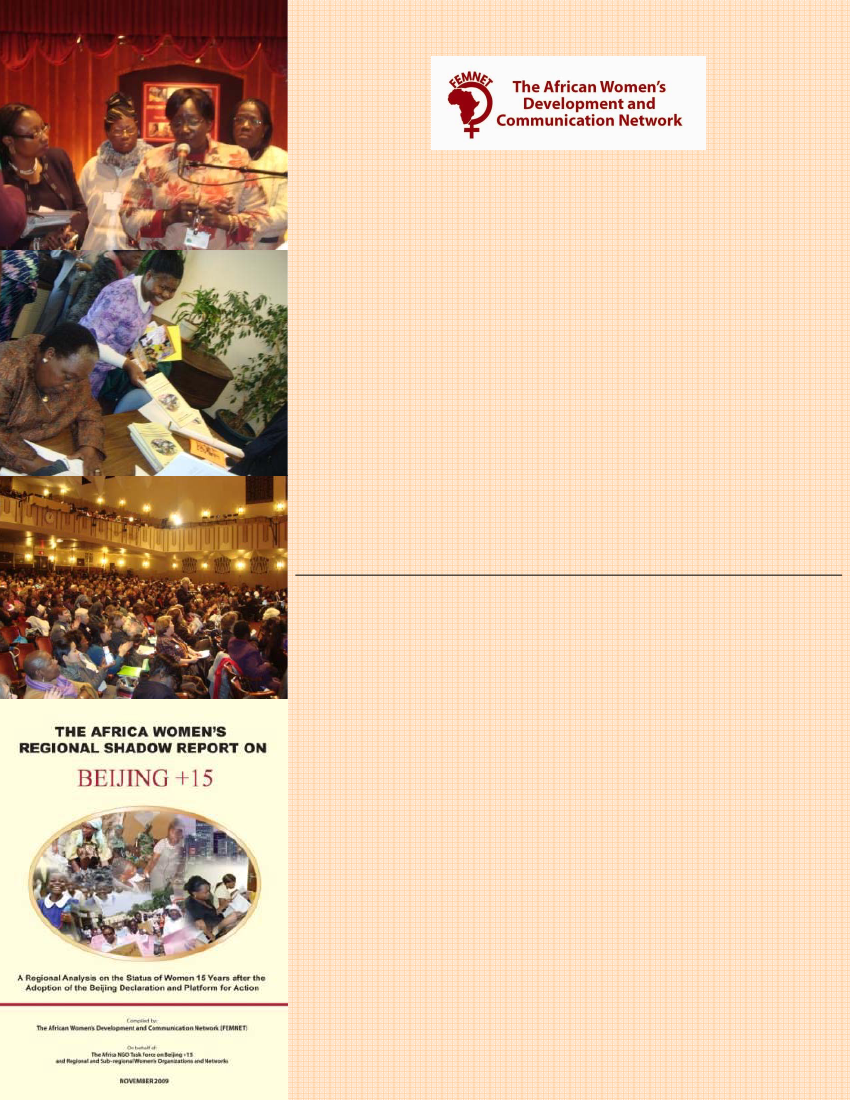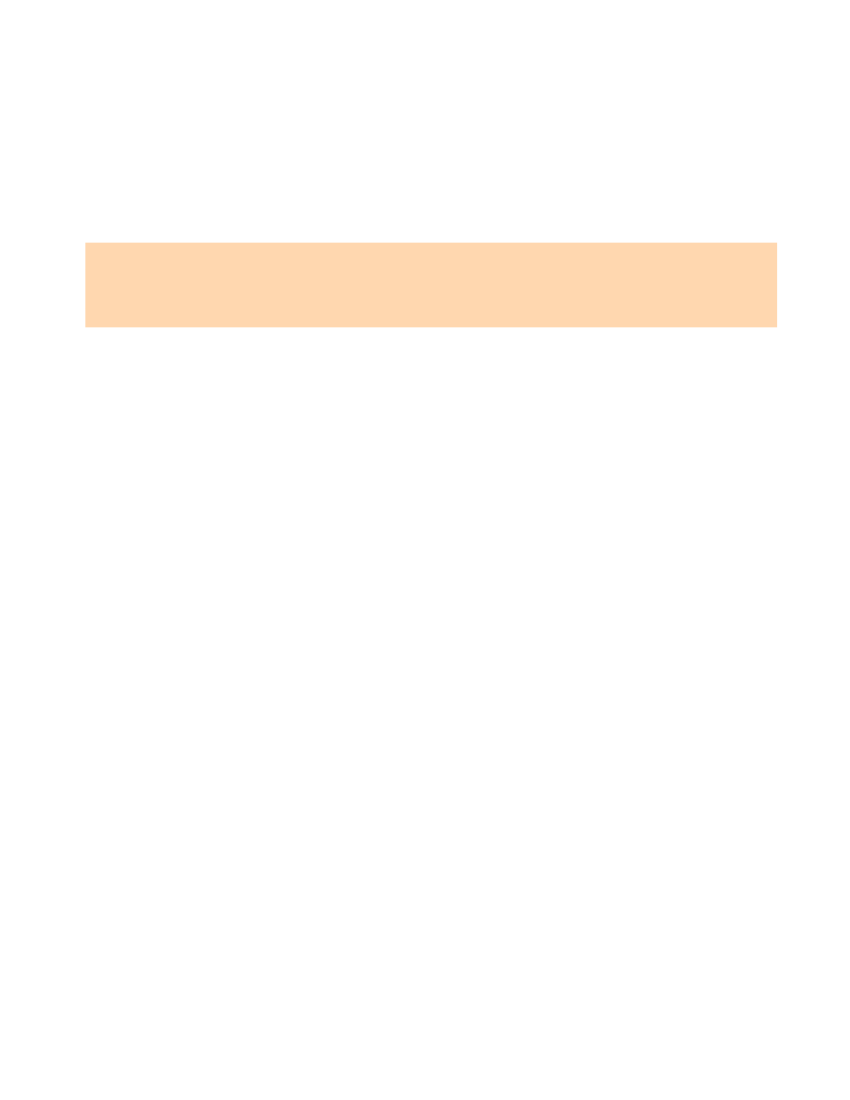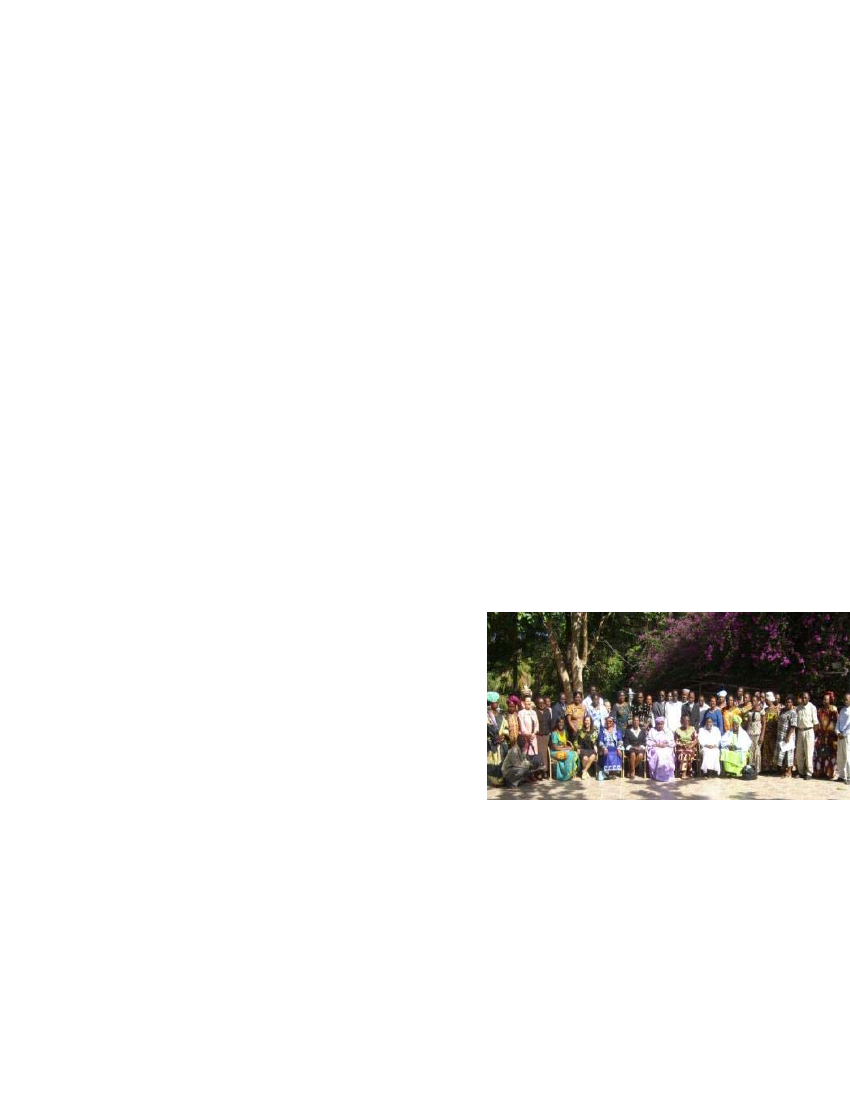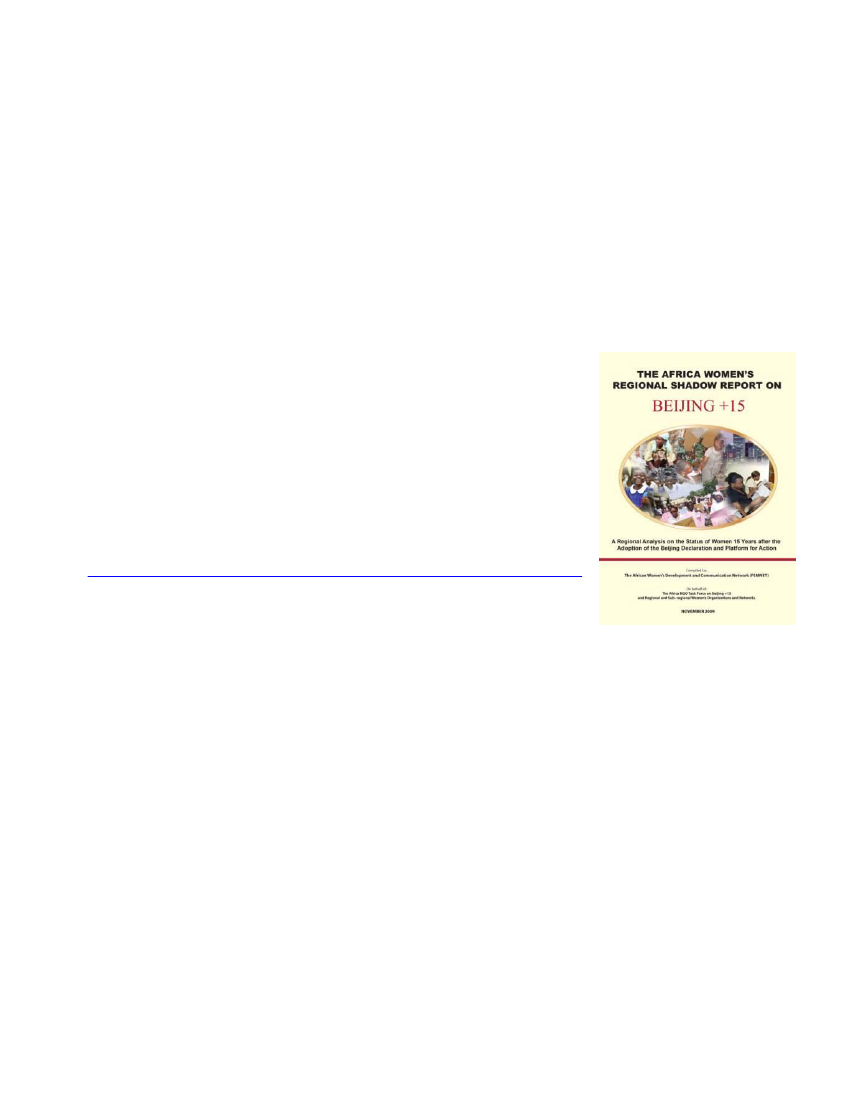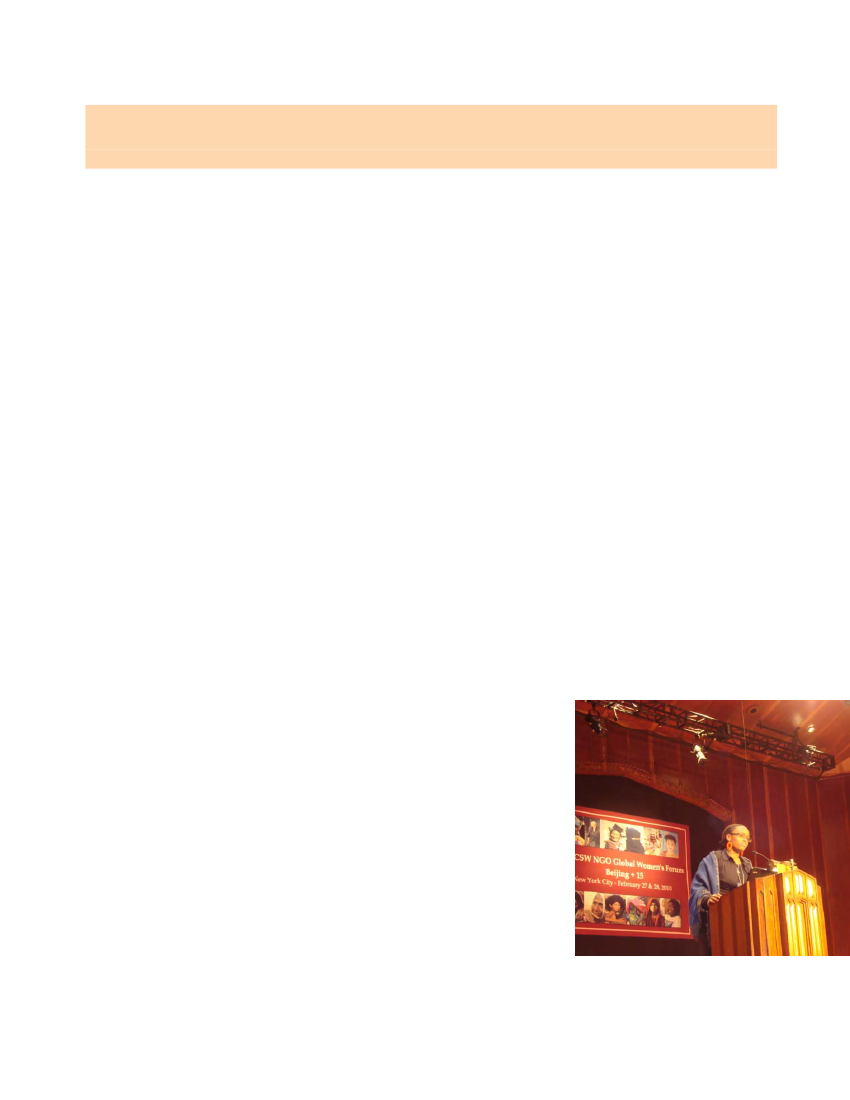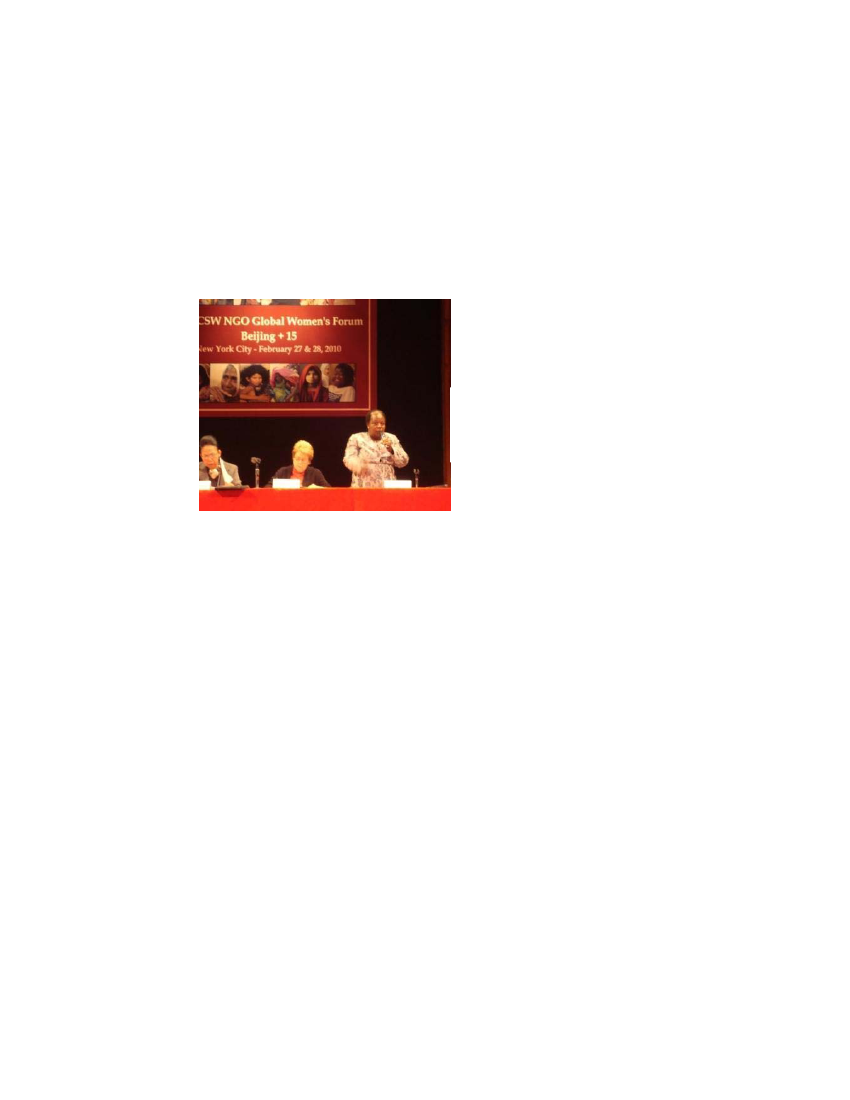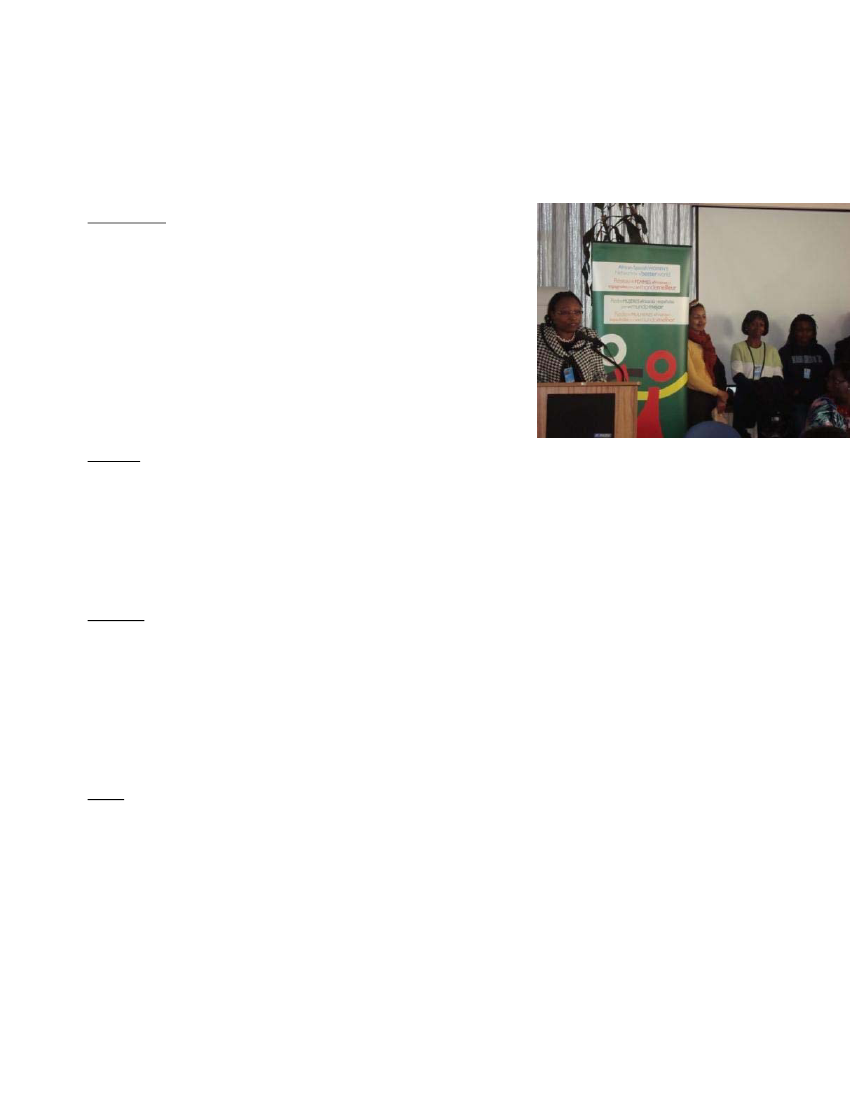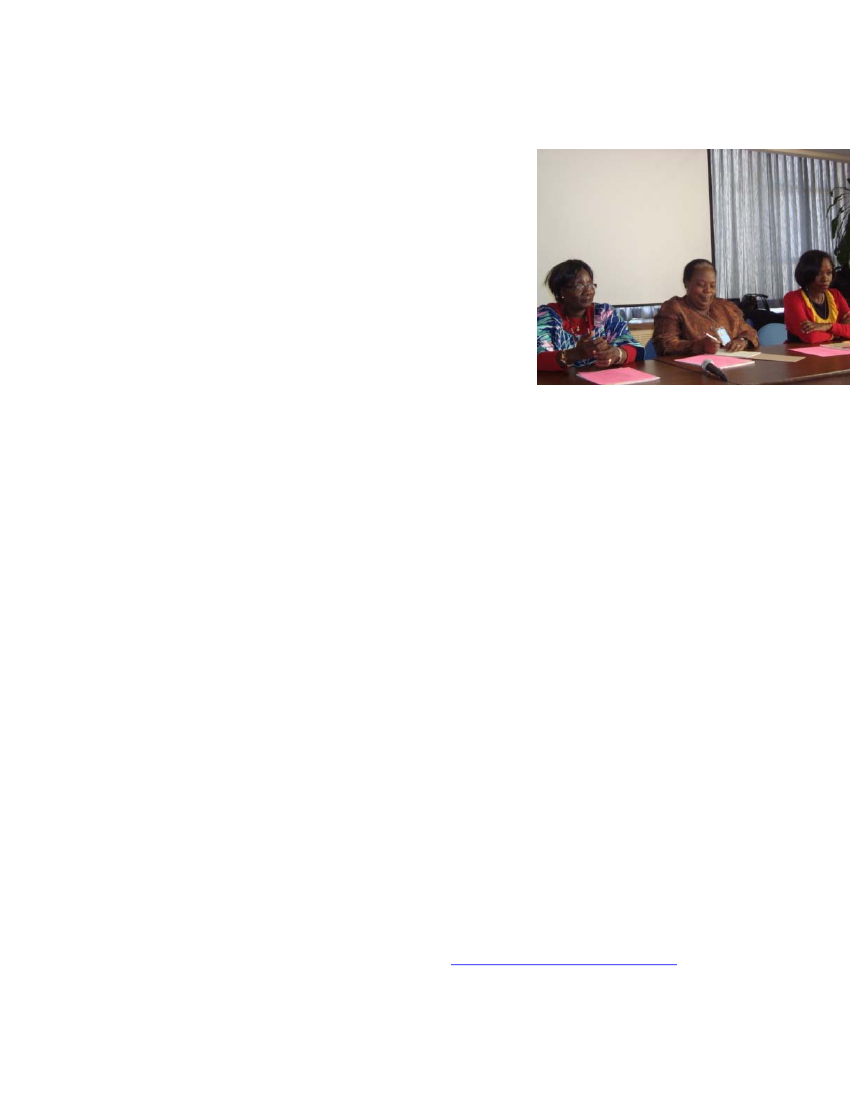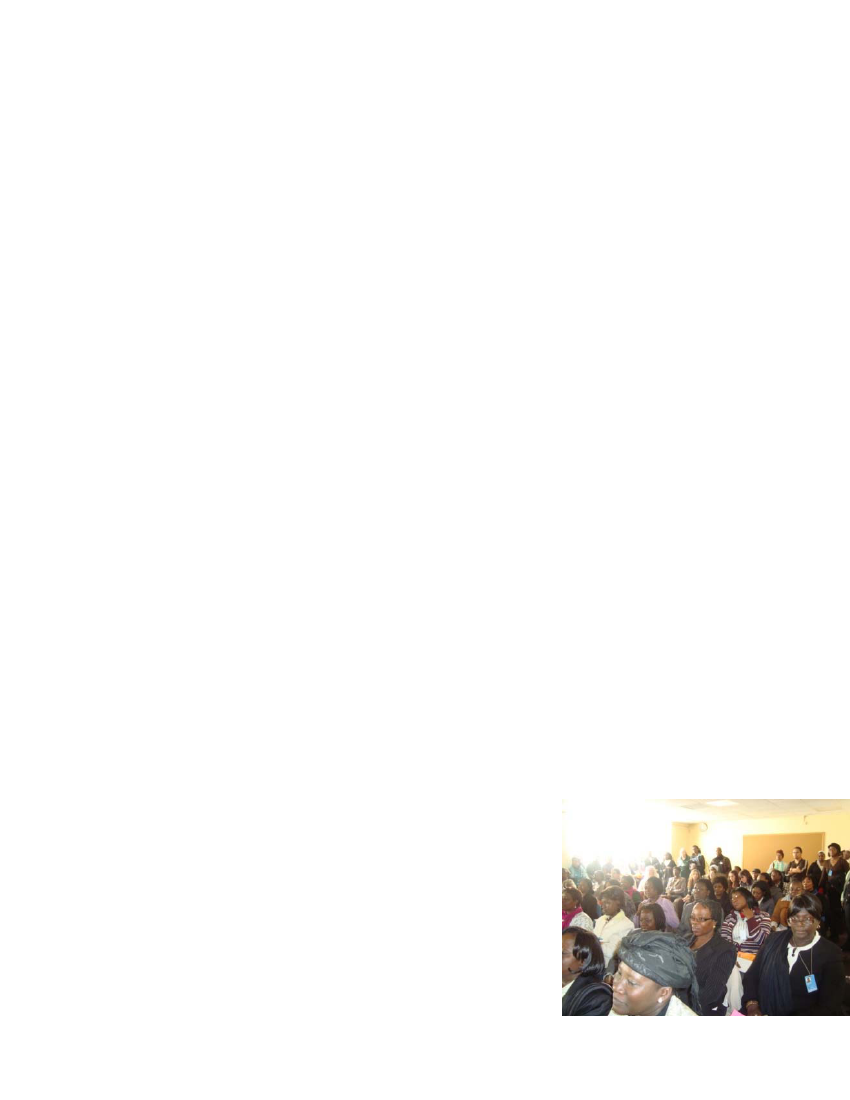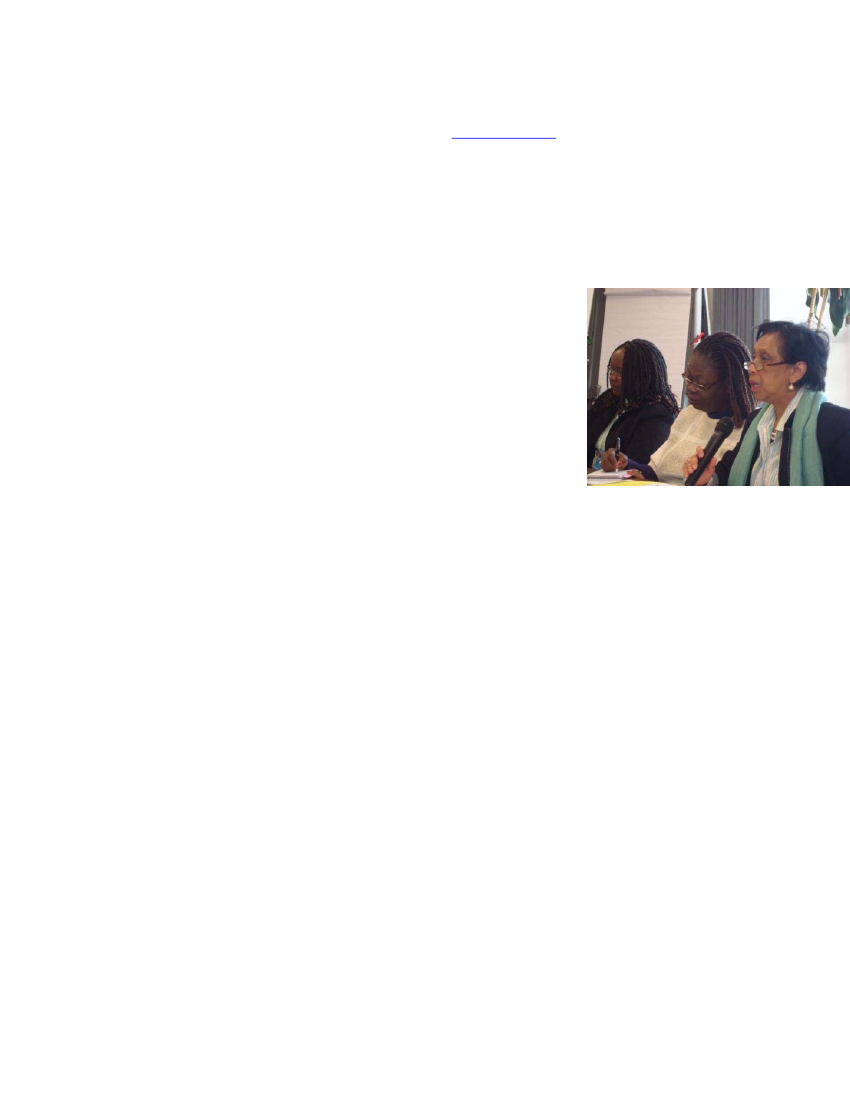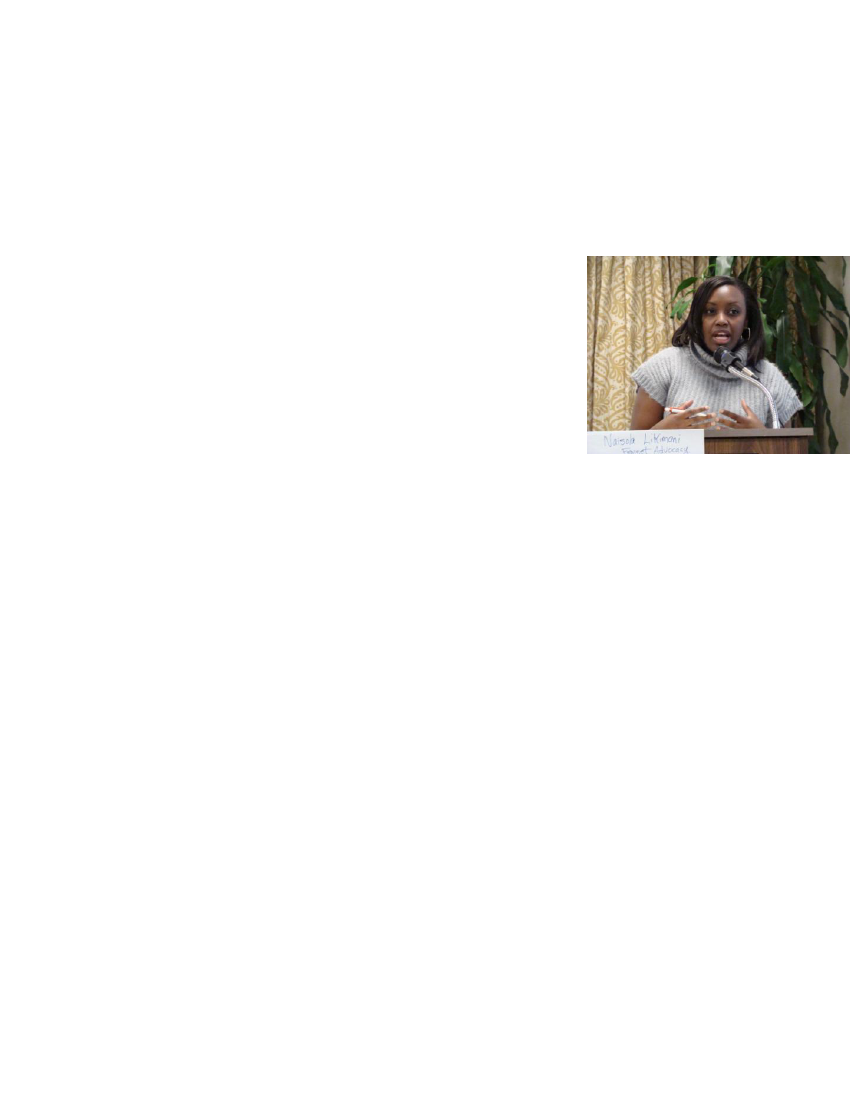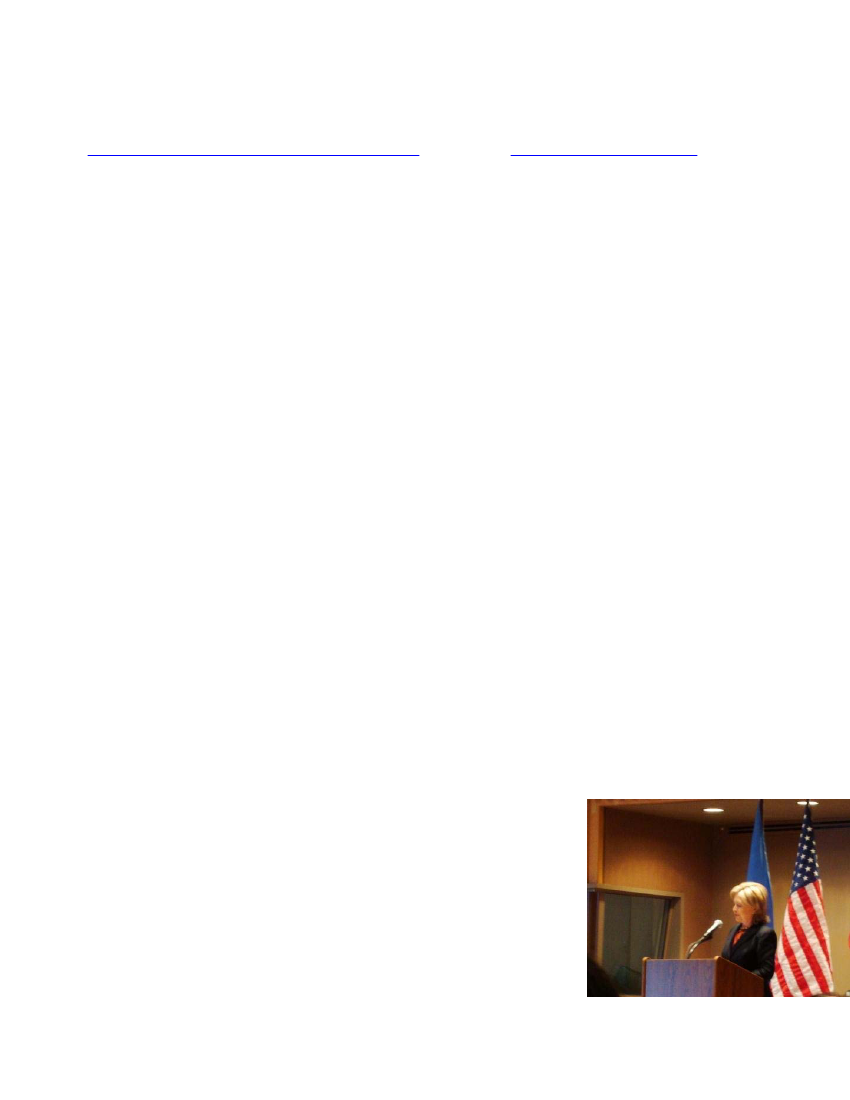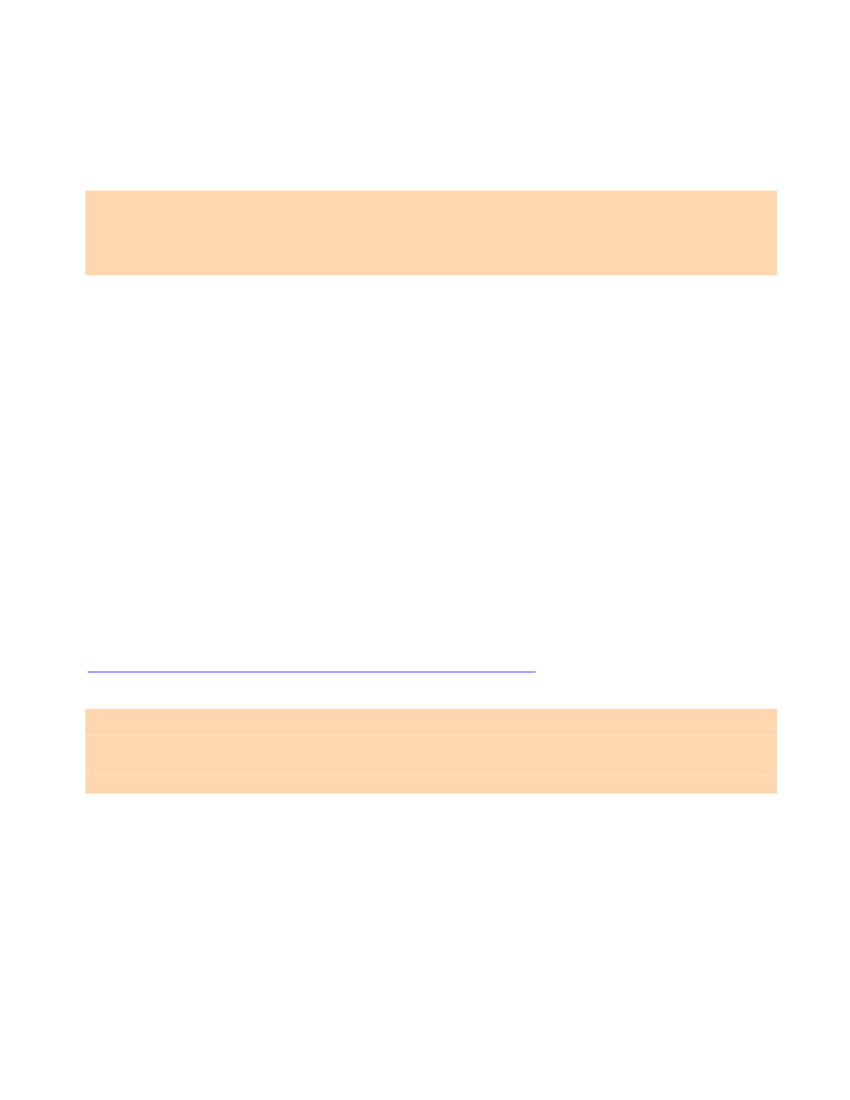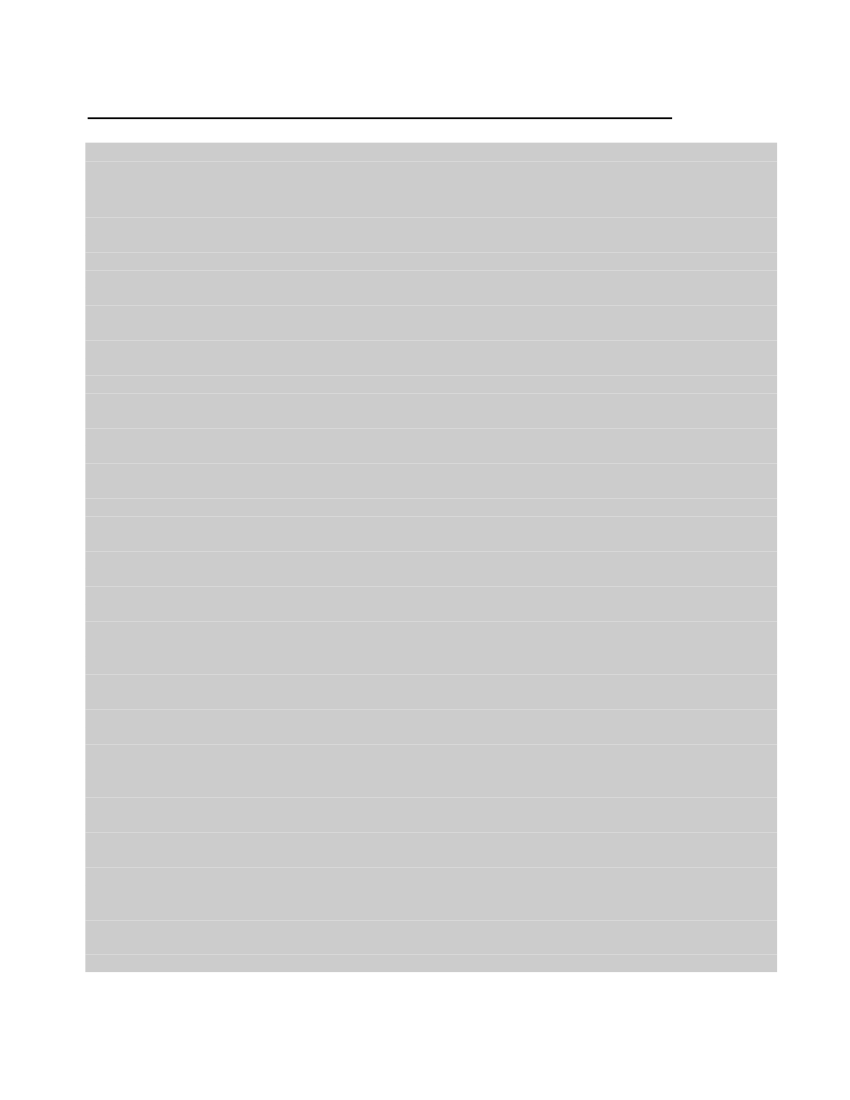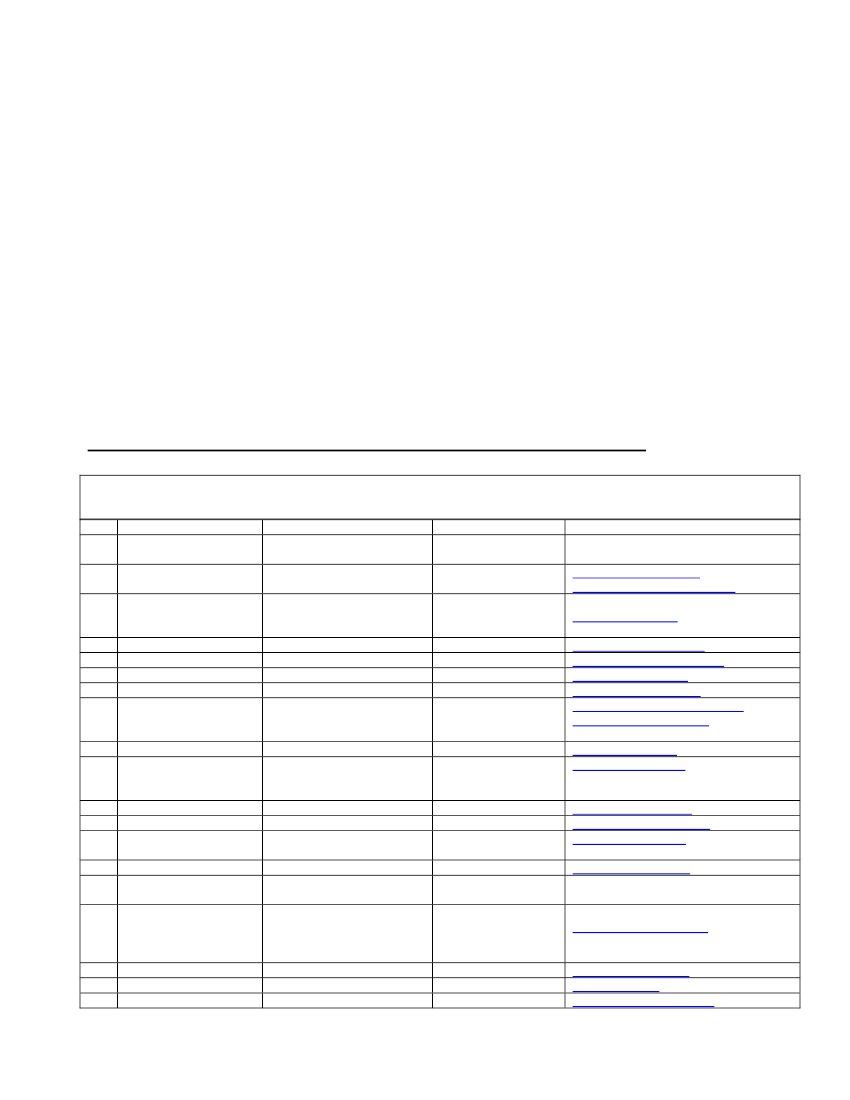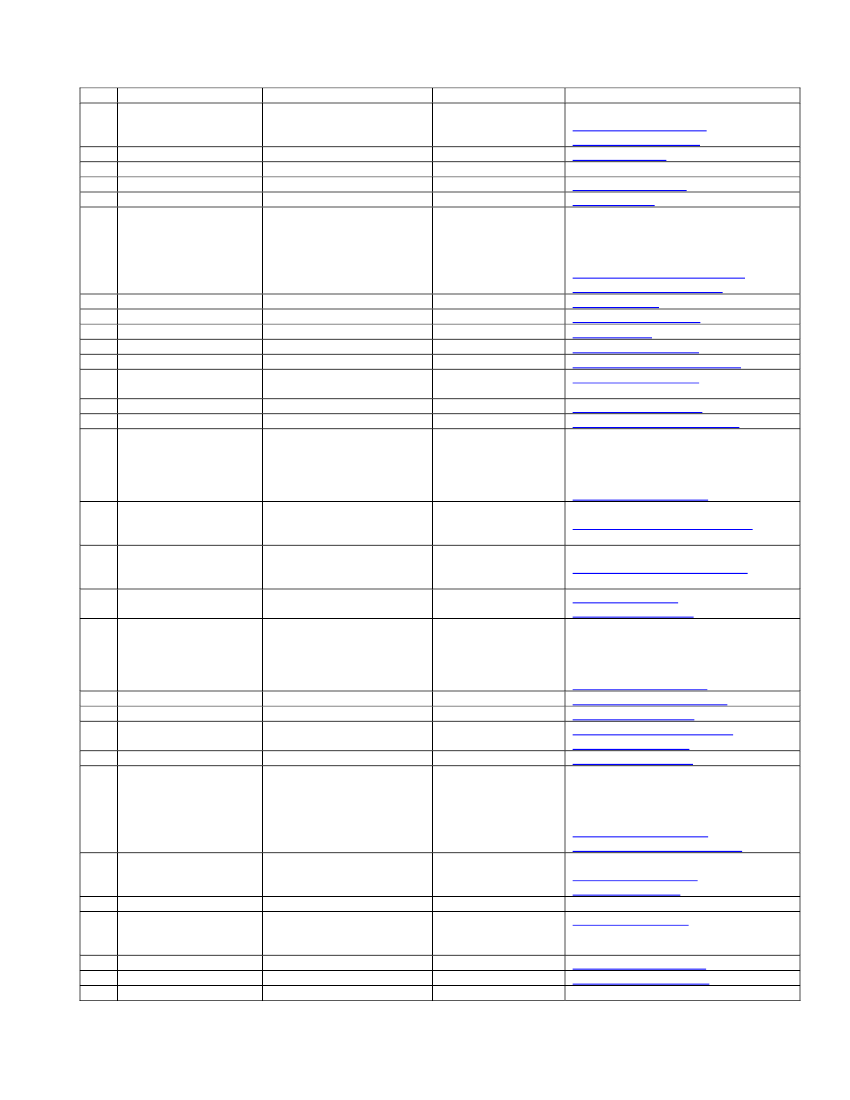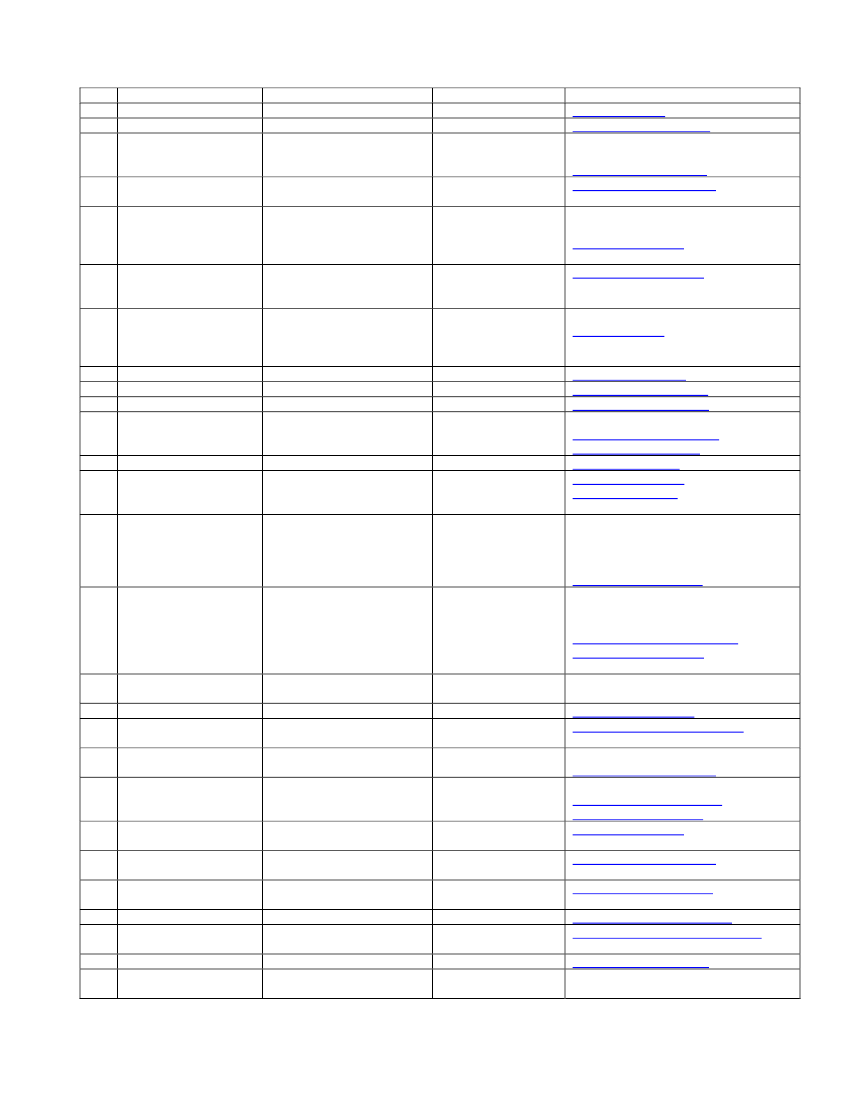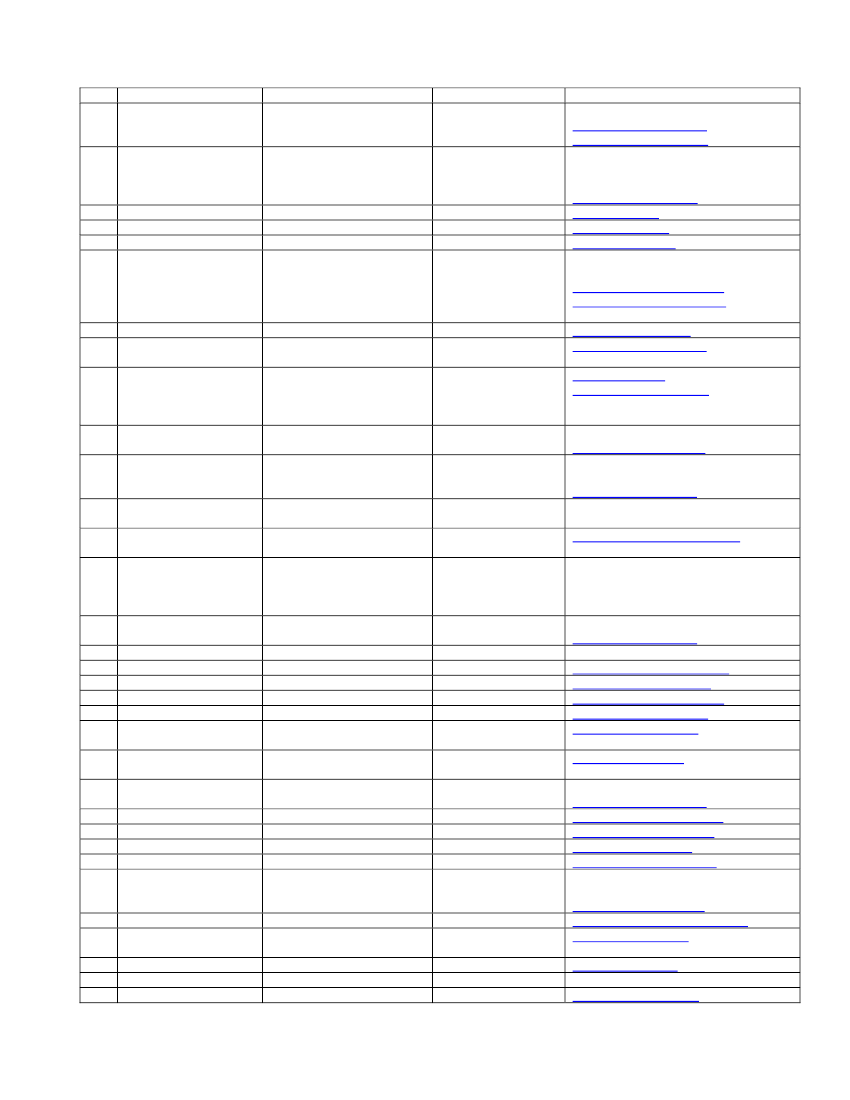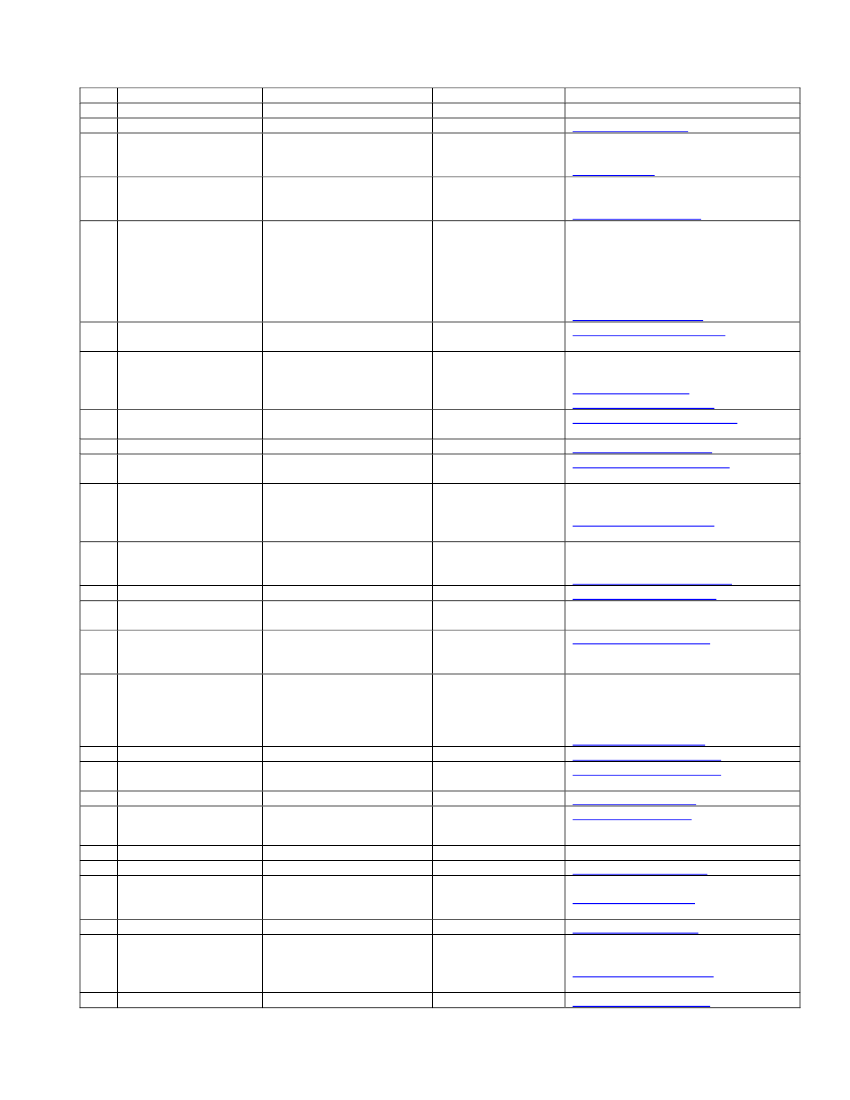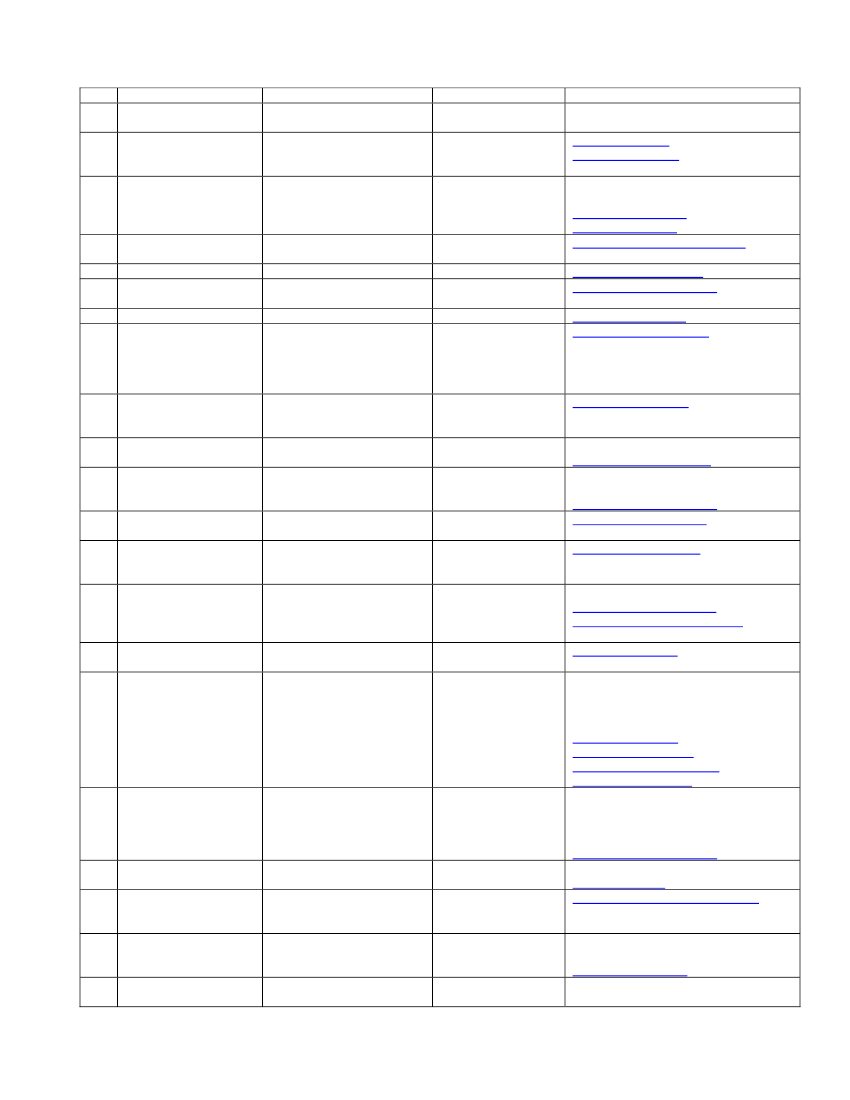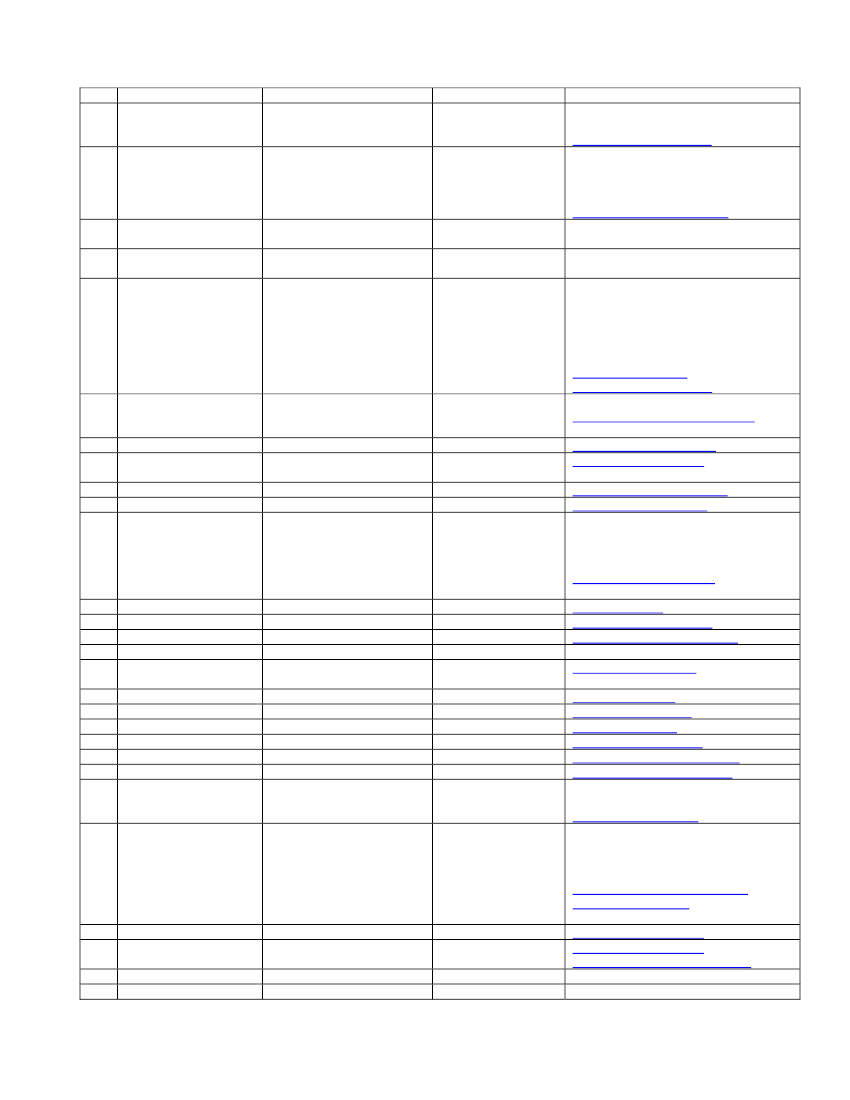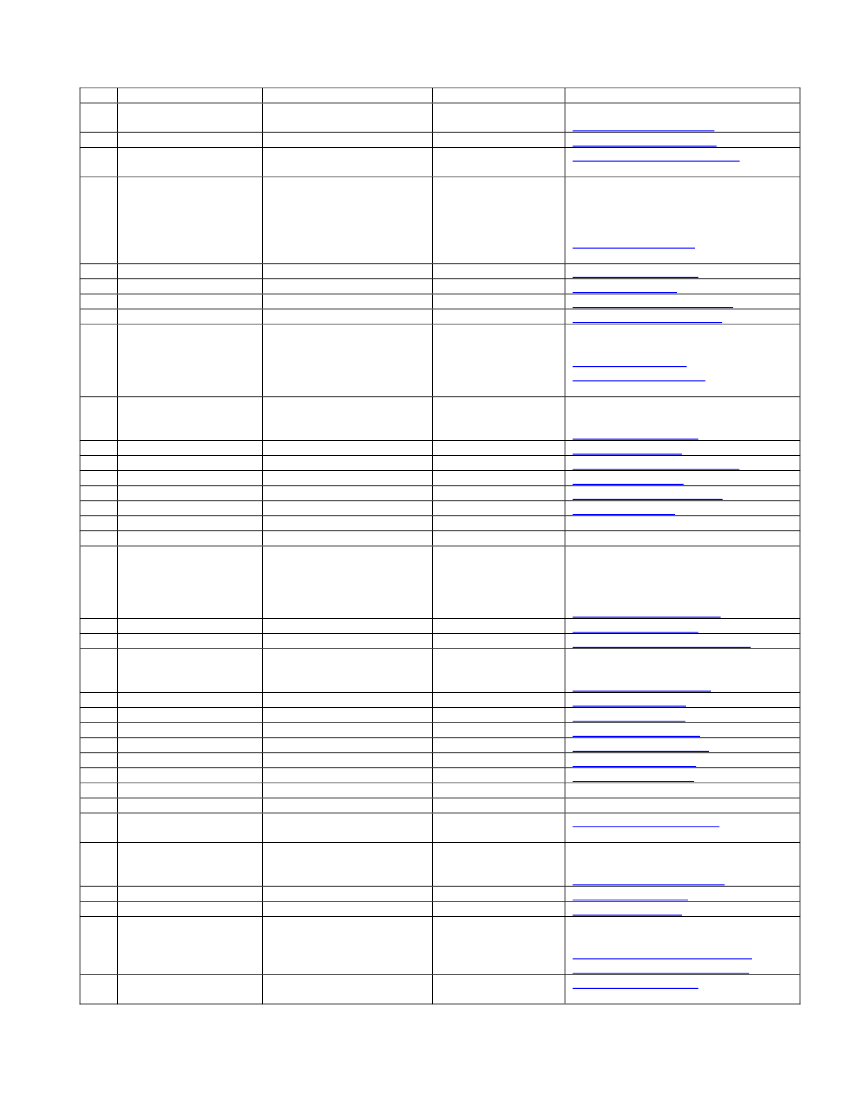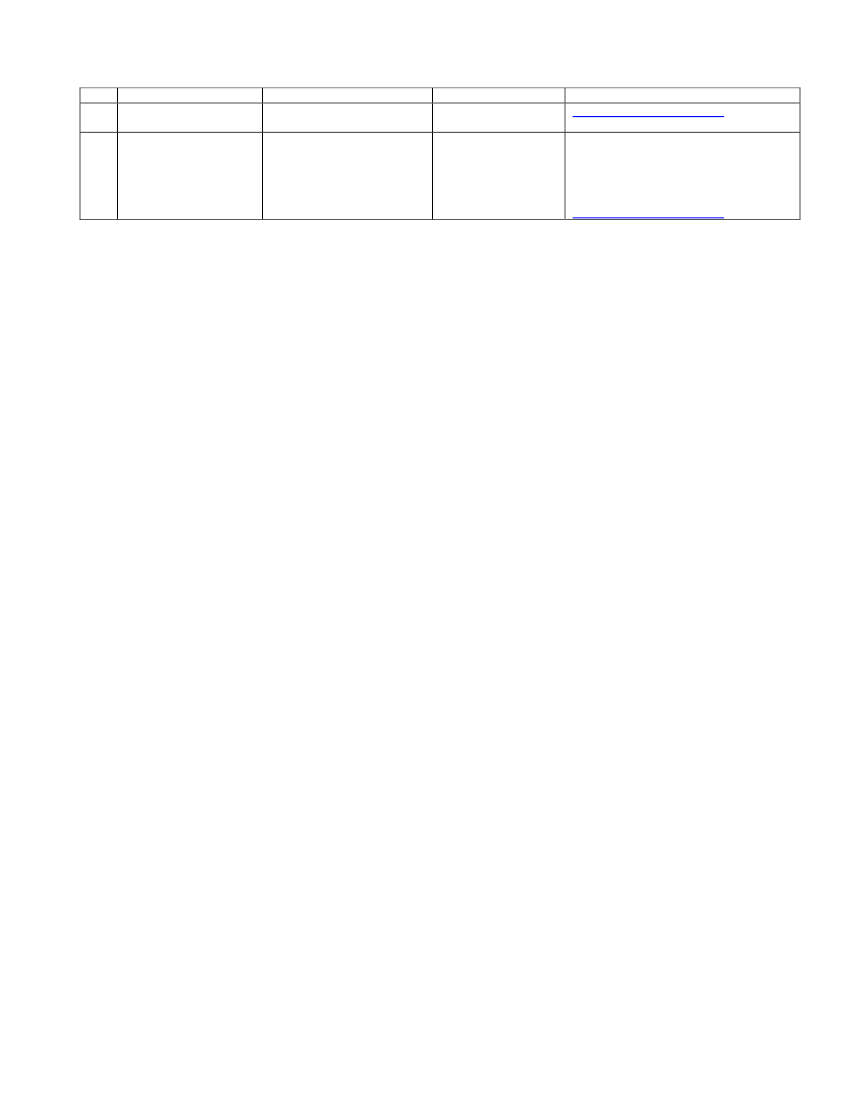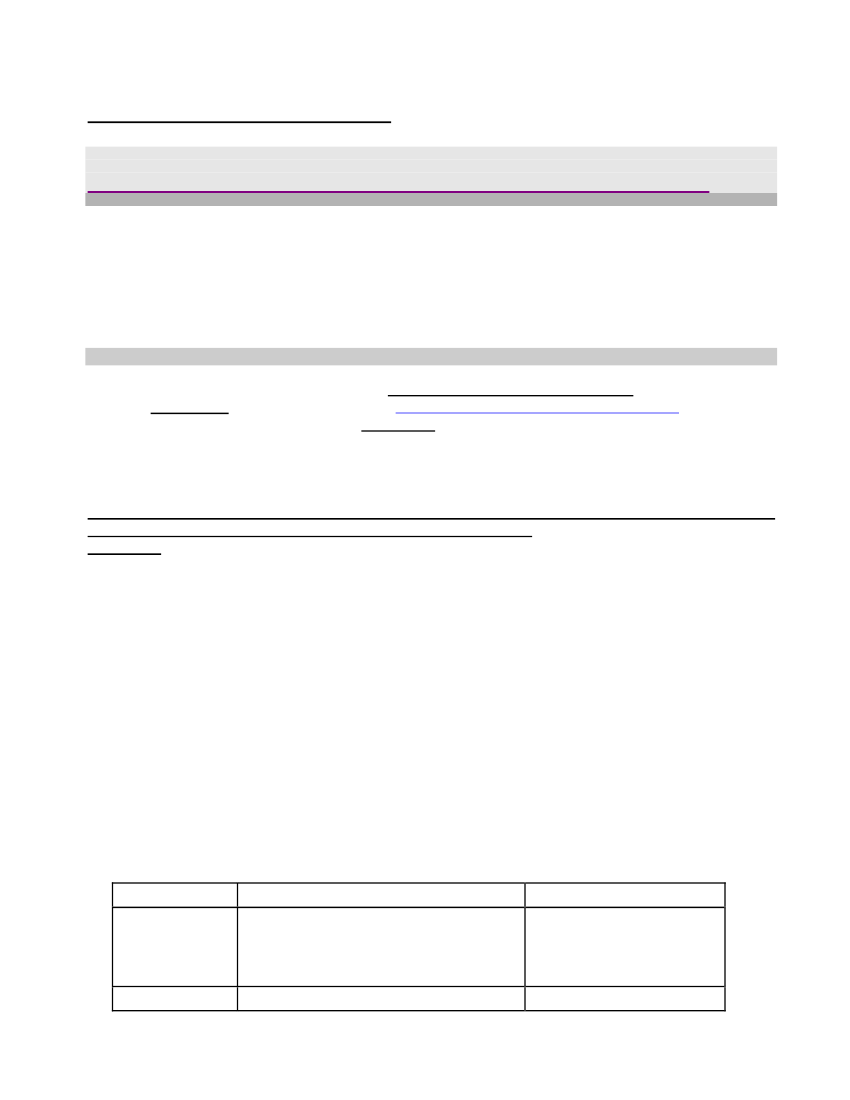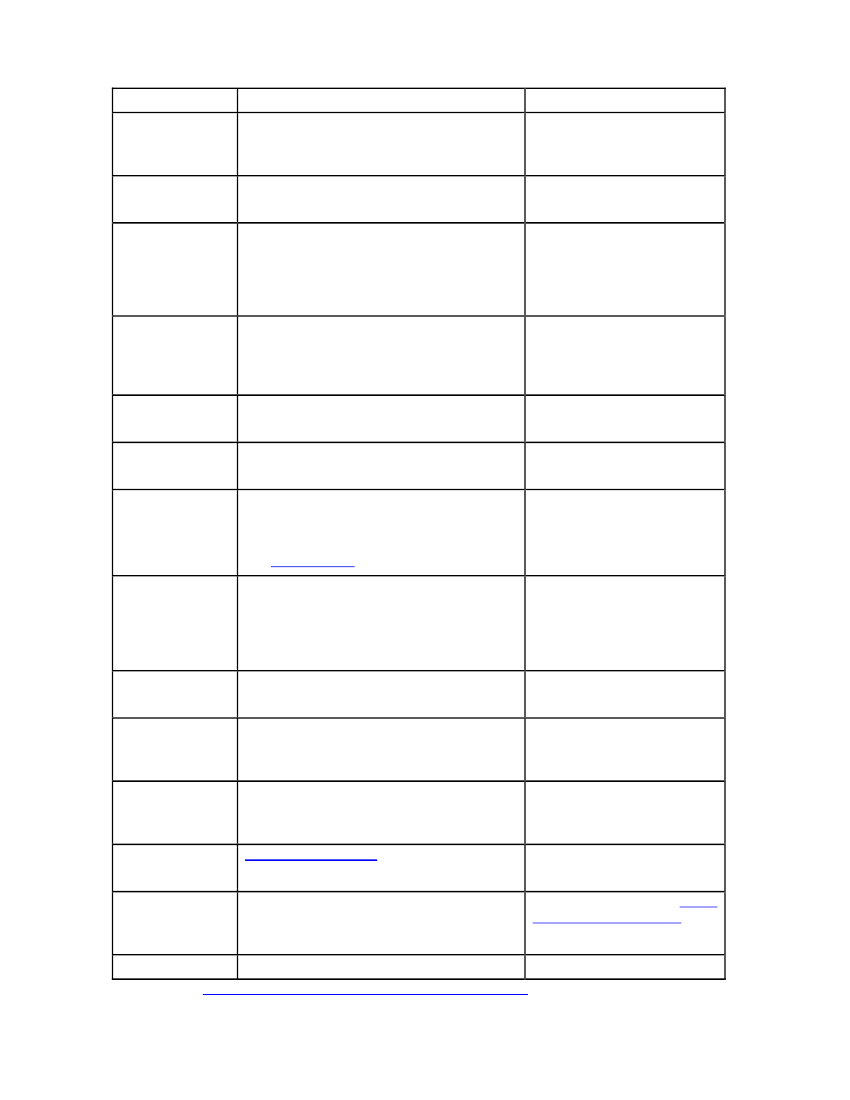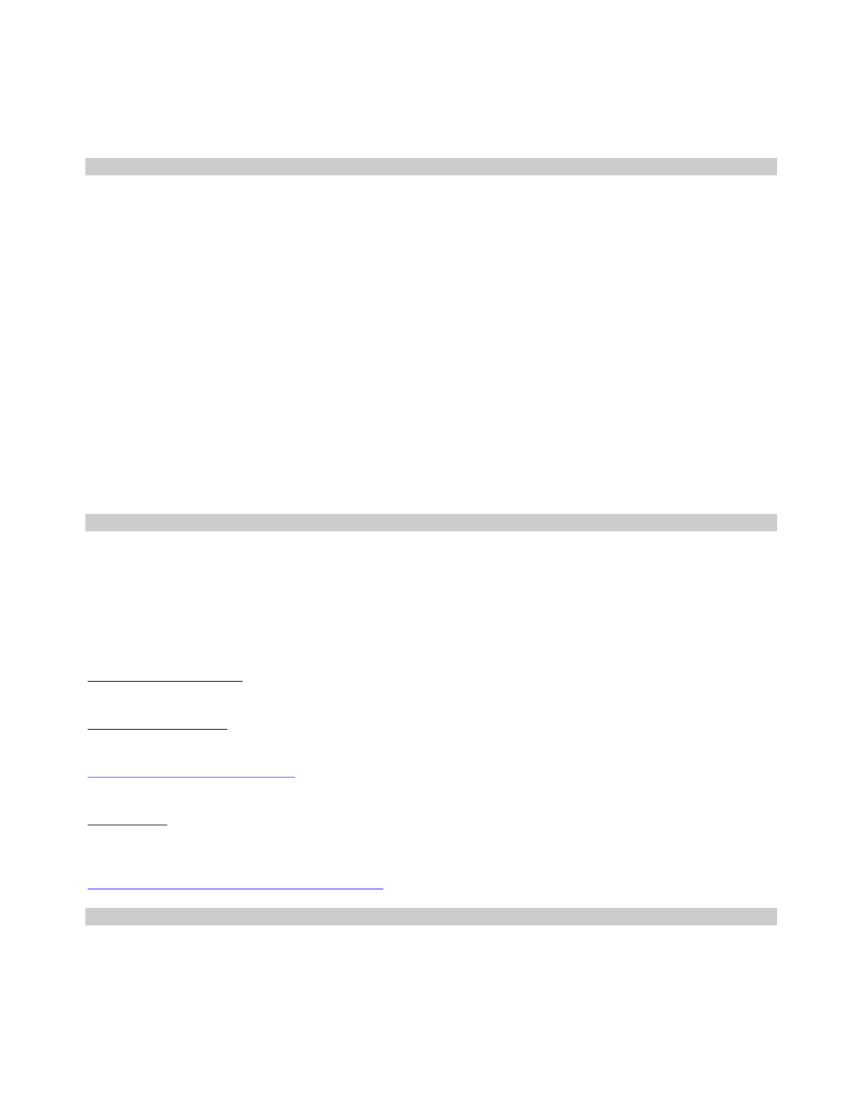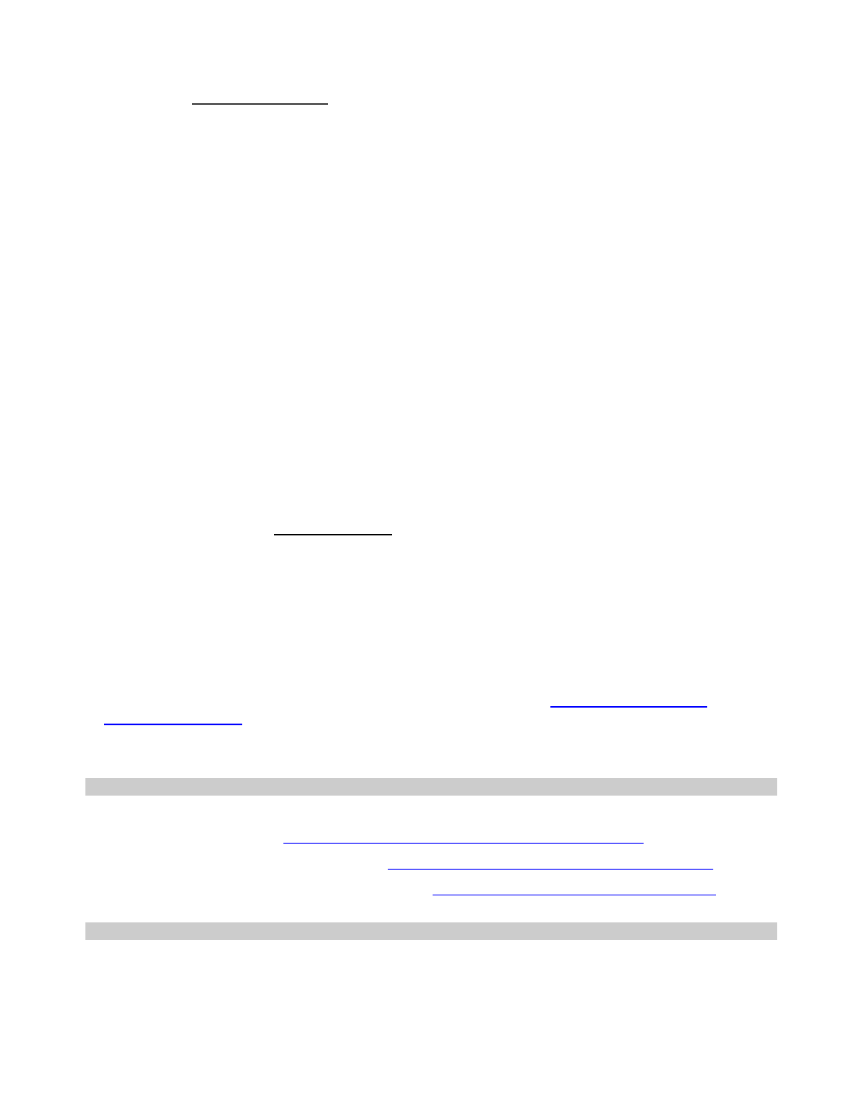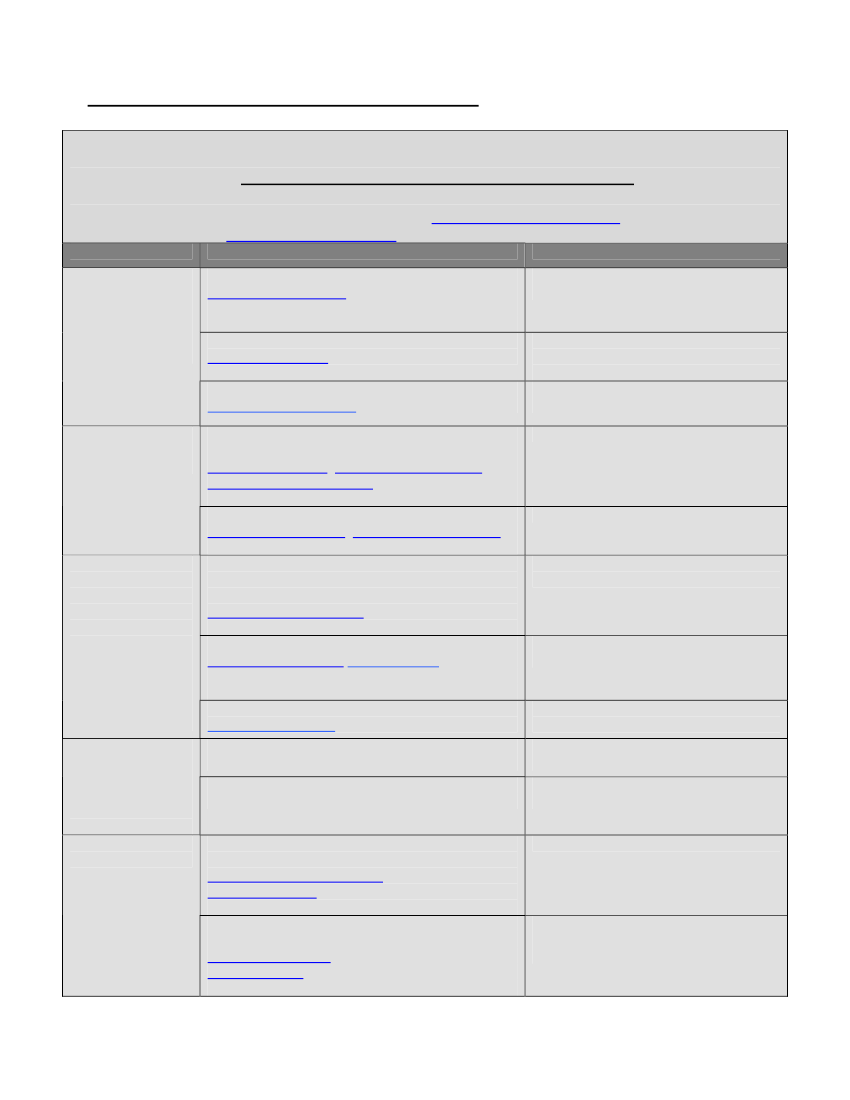Udenrigsudvalget 2009-10, Det Politisk-Økonomiske Udvalg 2009-10
URU Alm.del Bilag 182, PØU Alm.del Bilag 111
Offentligt
REPORT ON
THE 2010 UN COMMISSION ONTHE STATUS OF WOMEN
54thSession
15–Year Review of the implementation of theBeijing Declaration and Platform of Action
NEW YORKMARCH 1-12, 2010
Report compiled byNaisola LikimaniAdvocacy Officer, FEMNET
Table of ContentsThe Road to the 54thCSW (Beijing +15 Review) .............................................................. 3Mobilization of African women ...................................................................................... 3CSO participation in the Africa regional conference on Beijing +15.............................. 4The Africa Women’s Regional Shadow Report............................................................. 5Final Preparations for the 54thCSW.............................................................................. 5Other Key Pre- CSW 54thSession Events: ................................................................... 6Participation in the 2010 CSW 54thSession ..................................................................... 7Global NGO Forum for Women: Beijing +15................................................................. 7The African Women’s Caucus (AWC)........................................................................... 8Participation in Key Main and Parallel Events during the 54thCSW ........................... 13CSW Outcome Documents............................................................................................. 17Immediate Outcomes from the 54th CSW ...................................................................... 17ANNEXES....................................................................................................................... 19Annex A:Statement from the African Women’s Caucus to the 54thCSW........... 20Annex B:Joint CSO Statement at the 54thCSW................................................. 21Annex C:List of Participants at the African Women’s Caucus sessions ............. 23Annex D:Update to CSW List-serve ................................................................... 32Annex E:Africa NGO Taskforce on Beijing +15.................................................. 36
2
The UN CSW is a functional commission of the ECOSOC, and is the pre-eminent global policy forumon issues affecting gender equality and the advancement of women. It is particularly mandated toregularly review implementation of the Beijing Platform for Action at the global, regional, sub-regionaland national levels. The Commission is composed of 45 members elected by ECOSOC on a four-yearbasis. Every year, representatives of Member States gather at the United Nations Headquarters inNew York to evaluate progress on gender equality, identify challenges, set global standards andformulate concrete policies to promote gender equality and advancement of women worldwide.
The Road to the 54thCSW (Beijing +15 Review)The year 2010 marked the 15thAnniversary of the Beijing Declaration and Platform for Action, andconsequently the theme of the 54thSession of the UN Commission on the Status of Women (CSW)held in New York from March 1-12, 2010, was15-year Review of the implementation of the Beijing
Declaration and Platform of Action (1995) and the outcomes of the 23rdSession of the GeneralAssembly (2000).
Mobilization of African womenWith the recognition that the Beijing PfA review provided an opportunity to hold governmentsaccountable for their commitments to women’s rights, African women began mobilizing andorganizing to participate in the national, regional and global review processes of the Beijing Platformfor Action (BPfA) right from the 53rdCSW session held in March 2009.The impetus was an NGO consultation held in New York during the 53rdCSW, where the Africa TaskForce was set up to coordinate and mobilize NGOs in the African Region towards the 2010 Beijing+15 NGO Forum and CSW. Two coordinators volunteered to take responsibility to leading the reviewprocess within the Africa Region, and a Task Force of 10 members was also set up, with memberstaking responsibility to mobilize women and networks across the Africa region to participate in thenational, sub- regional and regional review processes. The list of the Africa task force is attached asAnnex E.Each Task Force member was responsible for mobilizing women’s organizations and individuals inthe four or five countries assigned, to carry out activities at the national level, aimed at raisingawareness on the Beijing +15 Review and ensuring that governments take further and appropriatemeasures and achievable actions to implement the Beijing Declaration and Platform for Action.Norah Matovu Winyi who is the Executive Director of FEMNET was a member of the Africa TaskForce and was responsible for mobilizing women activists and organizations in Kenya, Tanzania,Rwanda and Burundi. Various FEMNET Board members and staff were also part of the Task Forceand took responsibility for mobilizing in several countries in West Africa (Benin, Cote d’Ivoire, Togo,Niger, Burkina Faso), North Africa (Egypt, Algeria, Tunisia, Libya, Sudan, Morocco, and Mauritania)and the Islands (Madagascar, Comoro, Seychelles, Mauritius, Reunion and Mayotte). In total theteam from FEMNET was responsible for 19 countries. This placed a lot of responsibility on theorganization to ensure that the whole process succeeds.
3
In order to effectively mobilize organizations at the national level, FEMNET adopted various strategiesand approaches which resulted into a very wide outreach:1. Mainstreaming the Beijing +15 review into other FEMNET activities e.g. Post-CSW debriefingworkshops held in Uganda in April 2009 (for East and Southern Africa) and Burkina Faso in June2009 (for five French Speaking countries in West Africa); as well as the Gender Mainstreaming inMacroeconomics training workshop held in Cairo, Egypt in August 2009 (for North Africa).2. Development and timely dissemination of critical information, utilizing 6 list-serves, one-to-onemessaging, sharing through other networks and posting it on the FEMNET website.FEMNET disseminated information about the review process, developed guidelines for nationalworking groups outlining the process and timeline for the review and adapting the reviewquestionnaires developed by the United Nations Division for the Advancement of Women and UNEconomic Commission for Africa (ECA)3. Liaising with other regional and sub-regional women’s networks in Africa such as EASSI, WiLDAF,WLSA, AAWORD, AMwA and SOAWR to disseminate information and mobilize women at variouslevels.Concurrently, FEMNET engaged the African Centre for Gender and Social Development at the ECA,which was responsible for compiling the official Regional Beijing +15 report and convening the 8thAfrica Regional Conference on Women (Beijing +15) in Banjul, The Gambia. ECA assisted the NGORegional Taskforce by availing their teleconferencing facilities for Taskforce meetings, providinginformation about the process, as well as ensuring that all registered CSOs obtain Observer status forattending the 8thAfrica Conference on Women held in Banjul. UNECA generously shared informationwith FEMNET and by extension the Taskforce, to facilitate the review process and preparations forBanjul.
CSO participation in the Africa regional conference on Beijing +15In November 2009, the ECA convened the 8th AfricaRegional Conference on Women (Beijing +15) in Banjul,The Gambia, and created a space for civil society toparticipate in the Conference, including an opportunity topresent to the Experts Meeting their summarizedconclusions drawn from the synthesized draft AfricaRegional NGO Shadow Report and the discussions ofthe Africa Women’s Consultative meeting.FEMNET, as part of the Africa NGO Taskforce on Beijing+15, convened a two day Consultative meeting forwomen’s organizations in the margins of the 8th Africa Regional Conference on Women, to discussthe draft African NGO Shadow Report on Beijing +15, to dialogue on the key issues emerging andmake recommendations for further action from African Governments. A total of 100 participants from15 countries attended the Consultative meeting. Civil society subsequently presented the conclusionsand recommendations emanating from the Consultative meeting to the Experts and Gender Ministers’meeting, around national and regional issues that should be included and addressed in the finalofficial report. Several CSO recommendations were integrated into the final report of the Expertsmeetings, and adopted by the Ministers thereafter.
4
The Africa Women’s Regional Shadow ReportFEMNET took the lead in collecting the national reports and compiling the Africa Women’s RegionalShadow Report on Beijing+15 – A Regional Analysis on the Status of Women 15 Years after theAdoption of the Beijing Declaration and Platform for Action.Largely as a result of the Taskforce members’ efforts, thirteen countries submitted shadow reports orfilled out the adapted questionnaire to feed into the regional shadow report. Three sub- regional NGOShadow Reports were also compiled by WiLDAF-West Africa which covered 15 countries underECOWAS, EASSI which covers 8 countries, and WLSA covering the 14 SADC countries.As mentioned previously, the preliminary draft of the report was discussed by women whoparticipated in the Africa Women’s NGOs Consultative meeting held in Banjul, The Gambia inNovember 2009, which was held in the margins of the 8thAfrica Regional Conference on Women(Beijing +15). Their concerns and recommendations were later integrated into the final report.The Africa Women’s Regional Shadow Report on Beijing +15 provides asummarized analysis of progress, gaps and challenges identified inimplementing the BPfA particularly in the West, Eastern and SouthernAfrica sub-regions, with emphasis on the period since the last review in2004 (Beijing +10). It also maps out the progress, gaps and challengesunder each of the critical areas of concern, providing country-specificexamples and some of the significant contributions that have been madeby women’s civil society organizations in Africa. Finally, the report givesactionable recommendations to African governments in order toaccelerate the implementation of the BPfA over the next 5 years andtranslate the many commitments to the women of Africa into concreteactions. The Shadow Report is available in English and French onhttp://www.femnet.or.ke/documents/Africa_NGO_Report_Beijing_+15.pdf
Final Preparations for the 54thCSWBetween November 2009 and March 2010, preparations for the 54thCSW Session as well as theGlobal NGO Forum on Beijing +15 were in full gear, including:1. Resource mobilization - for the participation of African women’s organizations and individualactivists including grassroots and community leaders to participate in the Global NGO Forumand the 54thCSW.2. Planning for the African Women’s Caucus – This included the formation of a committee toorganize the sessions of the African Women’s Caucus during the CSW. The committeeconsisted of FEMNET, AAWORD, WiLDAF-West Africa, WLSA, and EASSI3.Sharing of information utilizing FEMNET’s CSW list serve and other channels, to facilitateAfrican women’s timely and informed preparations for participation in the CSW 54thSession(see Annex D for a sample update used for information dissemination during this period). Intotal 10 updates were developed, and disseminated to over 250 organizations and individualsin both English and French.4. Summary of the Regional Shadow Report – A one page handout was developed thatsummarized the highlights of the regional shadow report, in order to disseminate the keyconcerns and recommendations to African women at the CSW, governments and otherstakeholders, as an advocacy tool.
5
With the support of the African Women’s Development Fund (AWDF), the shadow report andhighlights handout were produced in English and French in time for the CSW. UNIFEM Horn and EastAfrica and the Africa-Spain Network of Women for a Better World supported FEMNET representativesand member organizations to participate in the proceedings at the Global NGO Forum, the 54thCSWand the parallel events.
Other Key Pre- CSW 54thSession Events:FEMNET supported several member organizations working with grassroots women to send arepresentative to the CSW 54thSession in New York. One of the organizations supported is GROOTS– Kenya which was also celebrating its 15thanniversary. GROOTS – Kenya was formed immediatelyafter the Beijing Conference on Women in 1995. The leaders decided to document their 15 yearsexperience by producing a documentary capturing inspiring stories of several women leaders inKenya working at the grassroots that had successfully transformed their lives and communities afterthey were exposed to the powerful stories of Beijing that their leader Esther Mwaura shared withthem. The documentary was launched in Kenya on the 23rdof February 2010 and the ExecutiveDirector of FEMNET had the opportunity to make a presentation on key elements of movementbuilding that had kept the torch lit in Beijing burning.On the 24thof February 2010 UNIFEM convened a Ministerial/ Experts meeting in Nairobi, Kenyawhich brought together ministers from the national women machineries from Southern Sudan,Uganda, Kenya, Tanzania and Somalia. It was a critical meeting where the participants were briefedabout the preparations for the 54thSession of CSW and harmonized positions on various issues thatministers wanted to present during their interventions in the sessions. The Executive Director ofFEMNET, Ms. Norah Matovu Winyi was invited to this meeting to share with the ministers theexperiences of international and regional CSOs in advocating for structural reforms within the UnitedNations (UN) on the Gender Equality Architecture. The campaign for reforms within the UN to improvehow this global governance body addresses issues of gender equality and women’s advancementhas been on since 1999. Civil society activists have been at the forefront of this campaign and lastyear at the UN General Assembly a critical resolution was adopted to set up a strong, well resourcedand strategically positioned gender entity within the UN.The ministers and experts at this meeting wanted to learn more about this experience and how theexperience can be used to inform the campaign strategies for strengthening the gender machineriesin African countries which were all found to have limited influence and capacity to delivery effectivelyon their mandate. Ministers agreed to have a follow up meeting and to lobby for the change of thedates for the CSW annual session so that they do not coincide with the Women’s day celebrations.
6
Participation in the 2010 CSW 54thSessionFEMNET was able to support 15 representatives to participate in the 54thCSW in New York:i. Ms. Mama Koite Doumbia -ii.iii.iv.v.vi.vii.viii.ix.x.xi.xii.xiii.xiv.xv.Ms. Astou Ndeye Sylla –Ms. Imane Belghiti -Ms. Mercy Siame –Ms. Mary Okioma –Ms. Elize Muhimuzi –Ms. Homa Mungapen –Ms. Matrine Chuulu –Ms. Gifty Dzah –Ms. Esther Mwaura Muriu -Ms. Florence Annan –Ms. Damaris Karimi –Ms. Marceline Fwaja –Ms. Norah Matovu Winyi –Ms. Naisola Likimani -Syndicat National de l'Education et de la Culture (SNEC) – MaliFEMNET ChairpersonFEMNET SenegalAssociation Nationale AL HIDN - MoroccoNGO Coordinating Council (NGOCC) - ZambiaWomen for Justice – KenyaComité National Femme et Développement (CONAFED) - DRCBahai National Council of Mauritius - MauritiusWomen and Law in Southern Africa (WLSA) - ZambiaWomen in Law and Development in Africa (WiLDAF) – GhanaGROOTS – KenyaYoung woman activist (Girl Child Network) - Kenya15-years old, Girl Child Network - KenyaWidows organization in rural TanzaniaExecutive Director, FEMNETAdvocacy Officer, FEMNET
FEMNET also worked closely with GenderLinks and Ms. Linda Odhiambo from the UN MillenniumCampaign in Africa to hold cyber dialogues.FEMNET engaged a New York based liaison, Ms. Dunstanette Macauley, for a period of one month tofacilitate on-the-ground preparations, provide advisory services to the coordinating team, identifysuitable interpreters, hire public address equipment and organize passes for all personnel that wereinvolved in facilitating the work of the Africa Women’s Caucus during the 2010 CSW Session.
Global NGO Forum for Women: Beijing +15The NGO Forum took place on February 27-28, 2010, to providewomen’s NGOs an opportunity to share regional perspectives on theimplementation of the BPfA, and discuss the state of women’s rightsand empowerment particularly since Beijing +10. Women leaders fromacross the globe assembled to share best practices, emerging issues,progress and challenges faced by women in their countries/regions,and give a joint call to action to the UN member states particularlythose represented by the CSW 54thSession.Some of the recurring themes at the Global NGO Forum include:The energy, hope, and enthusiasm the world leaders and womenfrom all corners of the world left with after the 1995 BeijingConference had not resulted/translated into transformation ofwomen’s lives fifteen years after this historical world conferenceon women. Majority of women in the world are still living in povertyand the commitments made in Beijing are wait to become reality intheir lives.
7
Women are contending with multiple crises - including food, energy, terrorism - that were not aspronounced at the time the Beijing Conference took place as they are today.Women leaders who were in Beijing need to pass the torch to young women to begin to set a newagenda, including the organizing of a 5thWorld Conference on WomenWomen have a better perception of who are their allies, are less starry-eyed about microfinanceand are going beyond gender mainstreaming as a panacea for achieving gender inequality andthe advancement of the women’s development agendaThe women’s movement can no longer work in a generalized way around women with disability,those with HIV/AIDS, and other marginalized groups. They need to acknowledge and work withthe diversities that exist in any particular grouping.Transformation of culture is required to end all forms of violence against Women and girls
“The Candle we lit in Beijing has not beenblown out. We have kept it alive” – GertrudeMongella
On Day 2 of the Forum, regional meetings were held to synthesize a common position and call foraction from the regions. FEMNET, AWDF and the Africa NGO Taskforce on Beijing +15 coordinatedthe regional meeting for Africa, and, using the Highlights handout based on the Africa Women’sNGOs Shadow report as a starting point, came up with 5 priority areas for action by Africangovernments. The statement from the Africa meeting was presented with verve to the general Forumby Ms. Florence Annan, one of the young upcoming leaders from the Girl Child Network. Thisstatement was later presented by Mama Koite Doumbia to the CSW Session on Friday the 5thofMarch 2010. (Annex A).
The African Women’s Caucus (AWC)The AWC held 4 meetings over the course of the 54thCSW Session, specifically held on March 1st,3rd, 5thand 10th2010. About 220 women participated in the sessions (Annex C contains a list ofparticipants).AWC Session 1: Launch of the Africa Women’s Regional Shadow Report on Beijing+15March 1, 2010UN Church CentreChair: EASSI – Ms. Marren Akatsa Bukachi, Executive DirectorAfter a welcome by Ms. Marren Akatsa Bukachi, Ms. Chigedze Chinyepi, Regional Coordinator for theAfrican NGO Taskforce on Beijing + 15 explained the process of compiling the report and introducedthe members of the Task Force who were present. She specifically recognized the central role thatFEMNET had played as a regional organization to sustain the review process throughout the one yearperiod. Nothing could stop the task force moving forward even when it was faced with limited
8
resources to undertake such an enormous task of mobilizing throughout the region across four officiallanguages commonly used in Africa.Ms. Bisi Adeleye- Fayemi, Executive Director of AWDF gave an overview of some of the highlights ofthe Shadow Report. She described the report in 4 words: Celebration, Despair, Urgency and Hope.Celebration: The Report begins with highlighting somecommendable achievements made in the implementation of theBeijing Platform for Action (BPfA), providing examples ofsuccess stories from different countries. These include amongothers the improved legal and policy frameworks for theprotection of women’s rights, increased space for women tospeak out on the issues that negatively impact their lives,increased demand for accountability and appropriate responsesevident at many levels, great strides in access to education forgirls and training for women, agency building and awarenesscreation.Despair: The feeling of despair about the report stems from the difficulty in sustaining the gains madein the face of economic and political instability and violent conflicts that have persisted in various partsof the continent; impact of HIV/AIDS on Africa’s economic growth and social development; struggleswith religious and cultural fundamentalism; increasing poverty among the urban and rural settings, theescalating violence meted out against women and girls, the increase in the trafficking of women andgirls and female economic refugees, corruption which undermines human rights realization andimpunity.Urgency: The sense of urgency that the Report raises is the heightened demand for a fundamentalchange. The status quo is a recipe for disaster. Africa will not and cannot achieve its developmentgoals if more than half its population is living in poverty, in a state of desperation and deprivation. Thesituation and status of the majority of African women must and has to change. The time for tokenism,rhetoric and empty promises is past. African women are ready to take charge of their destiny and theydemand accountability from African leaders and governments and other key stakeholders. Movingforward, they will leave no stone unturned to utilize all spaces to articulate their concerns and proposesolutions that are gender responsive.Hope: In spite of all the challenges and gaps, there is hope in the power of the women’s movement inAfrica; in the strengthened spaces for development; hope in the present wiser and the youngergeneration that may not have the hangover of Beijing; hope in the capacity of women to work togetherand move mountains; and respect for diversity and the ability to hold one another accountable.She concluded her comments by calling upon all those present to look to the future with determinationto write a different story. We cannot change what is past. Our strength lies in our actions in the future.Aluta Continua!Mama Koite Doumbia, the Chairperson of FEMNET appreciated the collaborative initiative of the oneyear April 2009 – March 2010 that made it possible for African women to come up with the Shadow
9
Report. She appreciated the contributions of various persons and organizations that played a leadrole in the review process.She ended her remarks by introducing Honorable GertrudeMongella, MP Tanzania, who delivered the keynote address.The highlights of Hon. Mongella’s remarks were that the AfricanPlatform for Action adopted in 1994 in Dakar, Senegal was thestrongest document that contributed to the Beijing Platform forAction. Africa brought in the 12thcritical area for action, which is“The Girl Child”. Hon Mongella said emphatically that Africanwomen are not victims but solutions to problems. It is ourresilience and creativity that keeps us on the move. She notedone big mistake made in the 1995 Beijing document as the lackof a timeframe and sanctions for member states that are notprogressively implementing the commitments made by leadersfrom 189 countries. She also noted that the need for clear commitments for resources fromgovernments was not clearly defined. This has probably been partly responsible for the slow pace ofimplementation.Hon. Mongella recalled what she said at the end of the Beijing Conference in 1995. “I said a revolutionhad begun and there was no going back.” Hon. Mongella was glad to see many young faces at CSW54 and she expressed hope that by Beijing + 20 there would be many younger women and girls wellseasoned and ready to take up the baton.She called on all women present to use the Beijing PfA as the election campaign manifesto anddemand from political parties and candidates what plans they have to implement it. All leaders with noclear plan and agenda to deliver on the commitments made to women through the BPfA should bevoted out of office. She concluded with an appeal to the women at the AWC session, “Let us have theright people in politics in order to have the BPfA implemented faster.” She launched the ShadowReport and pleasantly signed many copies for all those present to take as a souvenir back to theirrespective countries.Norah Matovu-Winyi, FEMNET Executive Director gave the vote of thanks. She thanked all theorganizations who facilitated the process of producing the Shadow Report and supporting manywomen and men to be at the Launch ceremony including UNECA, UNDP, AWDF, UNIFEM Regionaloffice based in Addis Ababa, Ethiopia, UNIFEM- Eastern and Horn of Africa Office, the Africa-SpainNetwork for a Better World, and Oxfam NOVIB and Sida, partners of FEMNET. She also thanked allthe members of the Africa task force for a job very well done. Last though not least she appreciatedthe Coordinating team that organized the Launch session in the first session of the African WomenCaucus: WiLDAF, EASSI, AAWORD, WLSA, and FEMNET.The African Women’s Development Fund (AWDF) immediately after the launch function took theopportunity to re - launch a coffee-table book titled “Voice, Power and Soul: Portraits of AfricanFeminists”. To obtain a copy go to the AWDF websitehttp://www.awdf.org/browse/1076
10
AWC Session 2: African Voices: How Implementing the Beijing Platform for Action is ImpactingWomen’s LivesMarch 3, 2010Uganda HouseChair: AAWORD – Ms. Odile Ndoumbe Faye, Executive SecretaryDue to the need for a bigger space to accommodate the large number of African women and othersfrom different regions participating in the Caucus, the second session of the AWC was held in theUganda House.Loveness Jambaya Nyakujarah of the Southern Africa Gender Protocol Alliance presented to theCaucus about the experiences of the women’s organizations that led to the adoption of the SADCGender Protocol in 2008. She noted that the Gender Protocol was a mechanism of domesticating theBPfA at the sub-regional and national levels in Southern Africa, and could be a good model for othersub-regions to consider. The key strategies adopted included drafting a model Protocol; mobilizingthroughout the sub- region to form a formidable force for lobbying and advocacy; amplifying women’svoice through a rigorous media campaign.Naisola Likimani, FEMNET Advocacy Officer then shared with the participants at the Caucus sessionon progress made in establishing the new UN gender entity, including the key lobbying points to useat the CSW session, which included: the need for the General Assembly to adopt a resolution toappoint an Under Secretary General to head the entity; the urgent need to lobby member states tosupport the establishment of the new entity sooner rather than later; the need to address the concernraised by some African countries like Namibia, Egypt, Uganda about the budget of the new entity.Many were blocking progress demanding that the bigger part of the budget of the new gender entityshould be provided through core funding. Their main fear is if the budget is funded mainly fromvoluntary contributions, it will give a lot of power to those countries making the contributions toinfluence its agenda and funding priorities. A participant from Zimbabwe also shared that Zimbabwewould be supporting Ms. Nyaradzai Gumbonzvanda for the position of Under Secretary General. TheCaucus discussed whether African women should rally behind one candidate for the USG position.However after an extended debate it was agreed that the criteria developed by the GEAR campaigngroup would be circulated and used by different countries to support any African woman whosequalifications and experience were in line with the criteria.AWC Session 3: African Voices II: How Implementing the Beijing Platform for Action is ImpactingWomen’s LivesMarch 5, 2010Uganda House - Chair: Association Nationale AL-HIDN, Ms. Imane BelghitiUN Church Centre - Chair: WLSA – Ms. Matrine Chuula, Executive DirectorA decision was taken by the coordinating team organizing thesessions of the AWC to have the sessions in two locations due tothe large number of African women wanting to participate in thesessions. Therefore, the third session of the AWC was split in twoand those who remained at the Church Centre had an opportunity toshare and learn from the stories and experiences from thegrassroots women on their initiatives to contribute to theimplementing the BPfA and take leadership to transform their lives.GROOTS-Kenya shared their experiences in the power ofgrassroots women organizing and building trans-generationalmovements. Grassroots women in Kenya have pioneered a home-
11
based care alliance and are currently using different strategies to ensure that home based care isaccounted for in the economics of the country and recognized by government. Participants thenwatched a section of the GROOTS-Kenya documentary on grassroots women organizing in Kenyaand were gen erally very inspired by the presentation, with one woman calling the session ‘the mostrefreshing’ she has been to at the CSW. GROOTS was born out of the Beijing Conference. It wastherefore celebrating and sharing with the world the successes of grassroots women transformativeleadership experiences.To give the participants another inspirational experience Ms. Marcelina Fwaja, a representative from awidow’s community based organization for economic empowerment, shared her story and thesuccess of the Village Savings and Loan scheme they initiated in her community. Participants wereinterested with the case study as they recommended that empowering women with financial serviceswhich are accessible and applicable at grassroot level population especially women, automatically itis easy to empower them in other fields such as economy, health, education, gender issues and allother fields targeted in the Beijing PfA.
“Thank you so much FEMNET and TGNP staffs! You really did wonders to me! I will make sure withGod's help and with support of you committed people, we plant an ever growing seed to our poorpeople! May God bless you and keep you well so that in collaboration, we make the local communityenjoy this world!”– Marceline FwajaThe second session took place at the Uganda House and it was mainlyattended by African women from the French speaking countries. At thissession Damaris Karimi a young girl from Kenya living with her mother andtwo siblings shared the experience of a young African girl born in a slumdwelling in Kenya. The issues raised included lack of privacy, the very poorhousing conditions, lack of proper sanitation and toilet facilities; the everpresent stench of rotting rubbish and dirty, filthy drains; the constant exposureto drug abuse, violence from peers and parents who cannot afford to feed theirfamilies; and for the girl child the fear of sexual violence from virtually everymale in the community.Damaris appealed to all the participants to support girls education. This is theirmain ticket to a better life. The most encouraging aspect of Damaris’ story isthat her present circumstances which are not her own making have not limitedher vision of what is possible in life.After the presentation there were many thought – provoking interventions fromthe participants. It was stated that the next five years must see an increase infocus on the transformation of urban slums as the conditions therein subject people to a whole rangeof human violations.After both sessions, the HIV/AIDS draft resolution from the CSW was shared and one working groupwas formed to work on the language of the resolution. Additionally the GEAR selection criteria for theUSG were distributed.AWC Session 4: Beyond Beijing +15: Strategies for the African Women’s DecadeMarch 10, 2010UN Church CentreChair: WiLDAF-WA – Ms. Kafui KuwonuThe final session of the AWC attracted about 100 participants, which is more than double the numberof participants in the last session of the AWC at the 53rdCSW. Mary Wandia of the Solidarity for
12
African Women’s Rights Coalition (SOAWR) shared highlights from a policy brief by SOAWR on howbest to utilize the African Women’s Decade (2010-2020) to accelerate realization of women’s rights inAfrica. The brief is available in English and French onwww.soawr.orgShe also shared that the AU Gender directorate is working on a plan to launch the Decade regionally.This involves the creation of national committees by May 2010; from May – July 2010 nationallaunches of the Decade will take place; and from July to October 2010 launches by the sub- regionaleconomic communities (ECOWAS, EAC, SADC and North Africa League of Nations). Finally, theregional launch of the Decade will take place in October 2010. Wandia encouraged Caucusparticipants to be involved in these various stages of building up the momentum for the launch andalso be engaged with national gender machineries around priority setting for the Decade.Thereafter Micheline Ravololonarisoa of UNIFEM made a briefpresentation on the Africa UNITE to End Violence Against WomenCampaign, its origins and objectives which include States developingnational laws and policies on VAW, data collection on the status ofVAW/Gs in each country, national campaigns involving CSOs, theprivate sector, and religious groupings to end VAW/Gs, and put an endto impunity for the perpetrators. In response to questions fromparticipants, Micheline emphasized that the Campaign will be based onstrengthening existing initiatives to end VAW/Gs at national level, ratherthan creating new ones.At the end of the session, Naisola Likimani, FEMNET Advocacy Officer,announced that there is an open letter authored by WEDO to SG Ban Ki Moon protesting that hisrecently appointed High Level Advisory Group on Climate Change Financing consisted of 19 men andno women at all. Participants were asked to suggest names of High Level women leaders to proposeto the Secretary General to address this situation. A total of 6 African women were added to the list.FEMNET Chairperson Mama Koite then gave a vote of thanks to all the organizers and participantsand closed the last session of the African Women’s Caucus.
Participation in Key Main and Parallel Events during the 54thCSW“I applaud women’s groups at global, regional and national levels for doing majority of the work onBeijing Platform for Action implementation” – UN Deputy Secretary General, Asha-Rose Migiro, at theopening of the 54thSession of the CSW, March 1, 2010.1. The Global Strategy Meetings and Parallel Events of the Gender Equality Architecture Reform(GEAR) campaignThe 2010 Global GEAR Strategy meeting took place the evening of Sunday, February 28, 2010. Over40 individuals gathered for the four hour meeting to discuss successes in the last six months,strategies for the CSW and to catch up on the GEAR campaign processes in the regions. Participantsshared global and regional updates and various activities that they planned for the CSW. The meetingoffered a strategic space for brainstorming and addressing serious concerns about the new genderentity.In addition to the strategy meeting, the GEAR Campaign also hosted two public parallel events toengage with the larger group of CSW delegates, one on Monday, March 1st and the other onThursday, March 11th. The events were informative and raised awareness about the UN reformprocess to date.
13
At the 54th session of the CSW the GEAR Campaign focused on raising awareness and attractingmedia to highlight the successes of GEAR and the crucial next steps for advocacy. On March 1st,GEAR campaigners distributed thousands of copies of the spoof newspaper that announced thecreation of the new UN women’s entity,The New Times for Womenin the UN headquarters. Thedistribution team ensured that ministers and ambassadors entering the opening session of the CSWgot their copy. After UN Secretary-General Ban Ki-moon spoke at the UN’s official observance ofInternational Women’s Day on March 3rd, NGO representatives held up signs that read “GEAR UPNOW!” in the balcony. The action was greeted with enthusiastic applause and strong support.On Friday, March 5th GEAR representatives including Naisola Likimani,FEMNET Advocacy Officer, spoke at the Youth Caucus and discussedhow young people can become involved in the GEAR Campaign andhow to integrate youth leadership into the new gender equality entity.On Thursday March 11thFEMNET once again participated in a GEARside event as a Regional Focal Point for Africa, particularly on advocacyefforts thus far and advocacy beyond the CSW.Finally, Governments initiated a resolution that was co-sponsored by180 countries and introduced by the Joint Coordinating Committee ofthe Non-Aligned Movement and Group of 77/China (JCC) supportingthe creation of the entity – reinforcing the widespread assumption thatthe new gender equality entity will indeed be established.
The Commission on the Status of Women, Recognizing the significant role of theUnited Nations system in promoting gender equality and the empowerment ofwomen worldwide, Welcomes General Assembly resolution 63/311 of 14 September2009, in particular the provisions on strengthening the institutional arrangements forsupport of gender equality and the empowerment of women by consolidating thefour existing offices into a composite entity led by an Under-Secretary-General, andlooks forward to its full implementation. (E/CN.6/2010/L.7)GEAR is currently focused on four critical arguments that will strengthen and make the new genderentity operate at its optimum level.Ensure that it is the driver in the UN system for women’s empowerment and gender equality andhas a strong, country- level operational capacity.Ambitiously fund the new gender entity with stable and predictable resources from the core budgetof the UN as opposed to voluntary contributions which in some instances are loaded withconditionsGuarantee that the entity has meaningful, systematic and diverse civil society participation at alllevels which contributes to its decision making and programmingBegin a transparent recruitment process for the Under Secretary-General taking into account thecriteria developed by the GEAR campaign team and shared with the UN Secretary – General’soffice.
14
2. Making IT work for gender justice: An African women’s NGO initiative at Beijing + 15Gender Links, the Gender and Media Diversity and media Southern Africa Network and the AfricanWomen and Child Feature Service in collaboration with UNIFEM and the World Bank jointly organizedBeijing + 15 cyber dialogues that were held every morning in three chat rooms in French, Spanish andEnglish. Expert panelists were on hand to debate the issues with those who joined from across theworld and the highlights of the discussions were reflected in a daily newspaper that was produced bythe team.The Executive Director, FEMNET together with Marren Akatsa of EASSI and a representative fromInternational IDEA were panellists on the first dialogue held on 2ndMarch 2010. The topic wasGovernance and the theme was “The best man for the job is a woman.” This provoked a lot ofdiscussion and some of the conclusions included among others the need to provide more support towomen in leadership as they are faced with daily resistance, discrimination, marginalization, andperpetual stress as they work hard to balance their multiple roles and responsibilities. Other topicsincluded equality in and through the media, Gender and Soccer 2010: Score a goal for genderequality; HIV/AIDS and care work: making care work count and Gender violence: Yes, we can endgender violence.3. Launch of the UNAIDS Agenda for Accelerated Country Action for Women, Girls, Gender Equalityand HIVThe agenda for accelerated country action was launched by UN Deputy Secretary General Dr. Asha-Rose Migiro, Mr. Michel Sidibe, Executive Director UNAIDS, H.E. Ms Melanne Verveer, U.S.Ambassador-at-Large for Global Women Issues and Ms. Annie Lennox, Musician and Activist, amongothers. The agenda for accelerated action provides guidance for UN agencies at the country level onactions to be taken in collaboration with governments, CSOs and development partners to makenational AIDS policies and programmes more responsive to the needs, and more protective of therights, of women and girls.Discussions during the launch included the need for an integrated approach that does not silo issuesof SRHR, family planning, access to healthcare, linkages between violence against women and HIV,women’s rights and literacy, among others. CSOs and government delegates (such as Zambia) at themeeting urged UNAIDS to universally implement this new action plan rather than implement a pilotprogramme first, as this issue was urgent and needed urgent action.UNDP representative Helen Clark shared that on their part they would be supporting leadershipdevelopment for girls/young women with HIV, and pushing for integration of HIV AIDS reporting underCEDAW. The International Labour Organization (ILO) shared that they are working on producing aninternational labour law on HIV AIDS in the workplace.4. The Africa Unite CampaignThe presence in New York of UNIFEM’s partners from African Government and CSO attending the54thsession of the CSW provided an opportunity for the UNIFEM Africa Section to organize abreakfast meeting on the March 5th2010. At this two hour meeting UNIFEM was able to brief thepartners on the UNIFEM programme in Africa, the changes that may happen with the setting up of thenew gender entity in the UN, the challenges that impact progress on gender equality and women’shuman rights in Africa. The most important briefing was on the Africa Unite Campaign againstVAW/Gs.
15
As part of the efforts to reduce the incidences of violence against women and girls UNIFEM launchedthe Global Virtual Knowledge centre. The setting up of the Centre was co-sponsored by theGovernment of Spain. The Centre is accessible through the FEMNET website athttp://www.femnet.or.ke/viewcampaign.asp?ID=6or directly athttp://www.endvawnow.org/5. Center for Women’s Global Leadership SymposiumIn celebration of the 20thAnniversary of the CWGL, a day-long symposium was held on March 6, 2010to take stock of the global feminist movement, in particular in the context of BODY (defending sexualand reproductive rights and ending gender based violence), ECONOMY (strengthening women’shuman right to economic justice) and MOVEMENT (sustaining global feminist organizing and buildingleadership).The Symposium was an opportunity for feminists to reflect on the three main issues, with thespeakers noting with concern that there is currently a backlash on women’s rights, using culture,religion and tradition to divide the women’s movement. Charlotte Bunch, Founding Director of CWGL,emphasised that “we have to reframe the issue of culture to be able to address the backlash.” Laterone of the panellists noted that the trend was ‘moral policing” disguised as culture/tradition. Anothertrend discussed was ‘criminalization of political dissent’ and the fact that ‘new ICTs have allowed us tocommunicate beyond the already converted’ however warm bodies are still needed to bring aboutsocial change.Finally on the issue of movement building, Ms. Bisi Adeleye Fayemi of AWDF categorized thechallenges the women’s movement face asAlignment challenge: losing alignment between our vision, our values and our practiceLeadership challenge: building architecture for the movement has oftentimes led to exclusionSustainability challenge: many women’s organisations are on ‘life support’6. Women’s Working Group on Financing for Development – Financing Across the SilosFEMNET Advocacy Officer Naisola Likimani was one of the panellists in this parallel event on March8, 2010, on financing for development from a gender perspective. It was noted that there is a need forpolicy coherence between gender equality, trade and development policies, and not only within theframework of the MDGs which should be considered as a minimal standard. One panellist noted thatthe UN is investing very little on the gender dimensions of climate change for instance, and there isneed to increase women’s access to climate change mitigation and adaptation funds. Generally,women are not involved in the central discussions around international relations such as theDevelopment Cooperation Forum (DCF) under ECOSOC. It was recommended that during this era ofglobal financial reforms, women’s organisations should analyze the global financial system and makerecommendations from a gender perspective.The 54thCSW Session ended on a very positive note on March 12, 2010with a special address from Mrs. Hillary Clinton, U.S. Secretary of State.In her remarks, Secretary Clinton discussed the many ways in which thestatus of women in the world is of social, political and economicimportance. “We must declare with one voice that women’s progress ishuman progress and human progress is women’s progress once and forall”.She pledged that the Obama administration would continue to work forthe ratification of CEDAW in the U.S., and expressed support for asingle, vibrant UN agency dedicated to women. In referencing USforeign policy, she shared the three pillars: Development, Diplomacy
16
and Defence, and stated unequivocally that subjugation of women is a threat to the national securityof the U.S.
“The progress of the last 15 years is not the end of the story. It is, if we’re lucky, the end of thebeginning” – Secretary Clinton
CSW Outcome DocumentsThe 54thCSW Session had a one page outcome document which re- affirmed the commitments of thegovernment to the Beijing blueprint. The civil society participants at the CSW in many ways expresseddissatisfaction with the document which virtually ignored the amplified voices of women from allcorners of the world that the progress in the implementation of Beijing was extremely slow. If progresson implementation of the Beijing Platform contributes to acceleration of progress on the MillenniumDevelopment Goals (MDGs), which is the world compact to eradicate poverty, then much more has tobe done.This was specifically expressed through the various interventions made by CSOs in the differentpanel sessions of the CSW. Norah Matovu Winyi the Executive Director of FEMNET made anintervention on the CSW panel on Regional perspectives which focused on the need for governmentto demonstrate their commitment to achieving gender equality and women’s empowerment bystrengthening national gender/ women’s machineries in terms of financial and personnel capacity andthe development of clear indicators of outcomes and impact resulting from gender mainstreamingefforts. These should be indicators that reflect the transformative impact of these processes.Some of the other statements issued by different groupings at the 2010 CSW included the Joint CSOStatement elaborating concerns on the reduced spaces for participation by women’s organizations inthe CSW processes (Annex B)Official CSW resolutions on Maternal Mortality, HIV AIDS and FGM are available on the CSW websitehttp://www.un.org/womenwatch/daw/beijing15/documentation.html
Immediate Outcomes from the 54th CSWSuccesses:Launch of the African women’s Regional Shadow report on Beijing +15, a culmination of almostone year’s efforts to amplify African women’s voices in holding their governments accountable forcommitments made to women’s empowerment and gender equalityMany African women and organisations were better prepared for the CSW due to timely andaccurate dissemination of information prior to the CSW.FEMNET Executive Director met an old friend and colleague Fransika Issaka, a former Minister inGhana and currently based in Northern Ghana, at the Global NGO Forum on the 28thof February2010, and asked her how she had received information about the session and the review process.
17
Ms. Issaka said“When NETRIGHT in Accra, Ghana received information from FEMNET theinformation was widely shared through their network members.”Several similar comments werereceived over the course of the CSW, with many participants thanking FEMNET for sharinginformation that enabled them to prepare for the CSW.Through the African Women’s Caucus and other spaces, African women were able to respond toopportunities for advocacy at the CSW such as being able to submit names of suitable candidatesfor the High Level Advisory Group on Climate Change Financing, lobby governments on the newgender entity and input into the final resolution on HIV/ AIDS and Maternal Mortality.Media coverage leading up to and during the CSW highlighted African women’s concerns andrecommendations on implementation of the Beijing Platform for Action. Media coverage includedInter Press Service and UN Non-Governmental Liaison Service (NGLS).Areas for Further Improvement:Need to work on new and innovative ways to quickly disseminate information during the CSW, aswell as bring African women’s voices and concerns to the CSW other than bringing themphysically to New York. The cyber chats / dialogues with GenderLinks and UN MillenniumCampaign were a great start, even though they faced a few technical glitches. The Daily Links @the CSW, a daily newspaper in English and French by CSO media organizations, providedexcellent analysis, interviews and information to participants at the CSO. Perhaps FEMNET canlink with the organizations to circulate this newspaper widely online during the CSW.Lessons Learned:The informal morning sessions held at the hotel where many FEMNET sponsored participantswere staying were a very useful space to strategize for the day and share materials andinformation from the previous day’s sessions.The official outcome documents of the CSW are best accessed through government delegations,so it is imperative that there is a CSO strategy of either being on the government delegations orgoing to their government morning briefings which are typically open to civil society participants.That relationship is key to access documents, learn about CSW internal deliberations andmoments for interventions. The drafting process happens very fast and CSOs have to be workingon the latest draft in order not to be left behind.
18
ANNEXESAnnex A:Annex B:Annex C:Annex D:Annex E:Statement from the African Women’s Caucus to the 54thCSWJoint CSO Statement at the 54thCSWList of Participants at the African Women’s Caucus sessionsUpdate to CSW List-serveAfrica NGO Taskforce on Beijing +15
19
Annex A:
Statement from the African Women’s Caucus to the 54thCSW
Oral Statement from African Women’s Caucus at the 54thCommission on the Status of WomenWe,the representatives of various African women’s civil society organizations assembled at the Global NGOForum for Women on Beijing +15 in New York in February 2010, and representing the voices of millions ofAfrican women, youth and girls;Having widely consultedwith different stakeholders prior to and during Global NGO Forum on the progress inimplementing the Beijing Declaration and Platform for Action in Africa since the last review (Beijing +10);Having reflectedon the situation of the African woman and girl in the region and reviewed the highlights ofthe African Women’s Regional Shadow Report on Beijing +15 which incorporates national and sub-regionalreviews from women’s civil society organisations and networks;Recognizingthat the Beijing +15 Review process is taking place at a time of both great opportunity andchallenge for African women in the realization of their civil, political, social, economic and cultural rights;Considering WITH GREAT CONCERNthat although the process of implementation of the Beijing Platformfor Action over the last 15 years has utilized significant resources, progress has remained minimal, slow andfragmented, and has not resulted in fundamental changes in the lives of the majority of women in Africa;We therefore call uponAfrican leaders, development partners, the private sector and all key stakeholders inthe development process to, among others, prioritize the following actions:1. Ensure ratification with no reservations, domestication and full implementation of all key human rightsinstruments that secure the rights of women and girls including CEDAW and its Optional Protocol, theAfrican Union Protocol on the rights of women, the African Charter on the Rights of the Child, the AfricanCharter on Democracy and UN Security Council Resolutions 1325, 1820, 1888 and 1889;2. Ensure that provisions and policies promoting the achievement of gender parity in leadership and decisionmaking are implemented and that women are sufficiently enabled to influence culture, systems andstructures of decision making institutions3. Ensure that structures established to lead the gender equality and women’s empowerment agenda haveincreased and significant resources as an indication of political commitment to women’s advancement;4. Increase support for African women’s economic empowerment as part of the strategy to eradicate poverty;5. Take action to eliminate all forms of discrimination against women and girls with special attention toharmful cultural and religious practices, violence in conflict and post-conflict situations and humantrafficking.We call upon African leaders to take the opportunity of theAfrican Women’s Decade (2010-2020)to takeleadership to significantly reduce the gaps in implementing the Beijing Platform for Action - specifically in thefirst three years of the Decade.
20
Annex B:
Joint CSO Statement at the 54thCSW
Civil Society StatementConcerning Beijing +15 process Review at Commission on the Status of WomenNew York, March 4th, 2010The Fourth World Conference on Women produced the Beijing Declaration and Platform forAction (BPfA), a comprehensive women’s human rights paradigm that envisioned thetransformation of power relations. This was a global vision of social justice, equality, developmentand peace. Fifteen years later, the BPfA would seem to be considered by governments astechnical instrument, and its substance has been depoliticised and diluted. The keyimplementation strategy of gender mainstreaming has lost its critical perspective andtransformative purpose in terms of power relations and inequalities.Women’s organizations have been the driving force behind the Beijing process. We note theSecretary General’s repeated emphasis on the importance of civil society to the work of the UN,particularly in relation to the achievement of women’s rights. As representatives of suchorganizations we are deeply concerned that the spaces for influencing decision making bywomen’s organizations at the Beijing+15 Review have been significantly reduced. This ismanifested by:The Declaration on the occasion of the fifteenth anniversary of the Fourth WorldConference on Women having been agreed ahead of time and adopted withoutconsultations with civil society.The absence of information on opportunities for civil society to influence the conduct andoutcome of the CSW meetings and the Declaration.Poor logistics and facilities that have prevented women from participating effectively.The presence of such a huge gathering of women has been used instrumentally to legitimise anempty Declaration. This is another example of the reduction of the space for criticalengagement between governments and civil society.The 54th Session of CSW was intended to be the opportunity to review progress and promote theimplementation of the Beijing Declaration and Platform for Action. However, in its failure tostrongly reaffirm and commit to renewed and concrete actions and resources to implement theBPfA, theDeclaration represents a backward step.The Declaration appears to overstate the progress made, and to ignore the slow and partialnature of implementation. It underestimates the degree and types of challenges that remain forwomen in their multiple identities, including the persistence of all forms of violence againstwomen. It fails to take into account changes in the global and local contexts. The currentcontext of multiple crises-- such as the food, energy, climate change, care , economic andfinancial crises-- new forms of insecurity, new aid modalities, internationalization of conflicts,perpetuation of the feminization of poverty and the ongoing struggle around women’s healthissues, including Sexual Reproductive Health and Rights and HIV/AIDS, have created challengesnot present 15 years ago.For this reason, we call upon the Secretary General, the Chairperson of the CSW and MemberStates to take all opportunities associated with the forthcoming global negotiations in relation toSpecial High Level Meeting of ECOSOC with the Bretton Woods Institutions, World Trade
21
Organization and the UNCTAD and the 2010 Millennium Development Goals (MDG) Summit inorder to recover the transformative nature of the BPfA by:Reaffirming the BPfA both as a comprehensive, critical and human rights framework thatrequires full implementation as a matter of urgency and as integral to and a prerequisitefor he implementation of the MDGs.Ensuring that civil society, including women’s organizations, is able to participatemeaningfully and that young women are empowered to become future leaders of theseprocesses.Committing to an accountability framework for the BPfA with concrete benchmarks andtimetables.Ensuring adequate funding for gender equality policies, programmes and institutionalmechanisms and for women’s rights organizations through the implementation, amongothers, of the 2008 Doha Declaration on Financing for Development, which has strongand concrete commitments to gender equality and women’s empowerment.Protecting the policy space of countries so that they will have the flexibility to determinetheir development pathways consistently with universal women's rights and globalcommitments.Creating in 2010 a strong, well-resourced UN Women’s Rights and Gender Equality Entitywith strong operational capacity and ability to hold the UN to account as well as strongmechanisms for meaningful civil society participation as supported and articulated by theGEAR (Gender Entity Architecture Reform) campaign.Signatures:Organizations:WIDE Network, Banúlacht, Ireland; AWID, Campana “Muevete por la Igualdad”, Coordinadora ONGDSpain, OneWorld Action- UK, Wo=Men the Netherlands, Feminist Task Force of the Global Call for Action Against Poverty,ENLACE, IFOR Women Peacemakers Program, DAWN, Women’s Working Group on Financing for Development,Siglo XXIII/SERR, Mujeres en Zona de Conflicto-Spain; African Women`s Development and CommunicationNetwork/FEMNET; Network for Women’s Rights in Ghana, NETRIGHT; REPEM (Red de Educación Popular EntreMujeres de America Latina y el Caribe); Red de Salud de las Mujeres latinoamericanas y del Caribe, RSMLAC;Red Mujer y Habitat Latinoamerica; Red de Mujeres Afrocaribeñas, Afrolatinoamericanas y de la Diáspora;Consorcio para el Diálogo Parlamentario y la Equidad (Mexico); Red Nacional de Mujeres, Colombia; Foro deMujeres y Políticas de Población (México); Confluencia de redes de Mujeres, Colombia; Mesa por la Vida y laSalud de las Mujeres, Colombia; Equidad de Género: Ciudadanía, Trabajo y Familia A.C. (México); DDESER/ Redpor los Derechos Sexuales y Reproductivos en México ((México); GIRE, Grupo de Información en ReproducciónElegida, México; Centro de Estudios para la Accion Femenina (Republica Dominicana); Feministas en Marcha(Puert o Rico); Geledés - Instituto da Mulher Negra (Brasil); Articula§ão de ONGs de Mulheres Negras Brasileiras(Brasil); Mujeres Sonorenses en Acción MUSA (México); Milenio Feminista (México); Programa FeministaCentroamericano la Corriente (Nicaragua); Red de Observatorios de Violencia Social y de Género (México);Espacio Espiral, Promoción Cultural, Desarrollo Sustentable y Equidad AC (México); Balance Promoción para elDesarrollo y Juventud (México); Forum de PolíticaFeminista –Spain; PPIINA (Plataforma por Permisos Iguales e INtransferibles de Nacimiento y Adopción).- Spain,PLENT (Platform for Equal & Non-Transferable Parental Leave) – Europe; Le Monde Selon les Femmes- Belgique;WIDE Austria; KARAT; Teamsters Canada; Syndicat Canadien des communications, energie et du papier (SCEP);Public Service Alliance of Canada; Canadian Teachers' Federation; Canadian Union of Public Employees;Fédération interprofessionnelle de la santé du Québec – FIQ; L’Alliance canadienne féministe pour l’actioninternationale (AFAI), Alberta Federation of Labour (AFL); Autonomous Women's Center, Belgrade; NWCI; MATCHInternational; Canadian Federation of University Women (CFUW); Canadian Federation of University Women;Confrontations, Utopia; Human Rights in Democracy Centre (HRDC), Albania; Arab NGO Network forDevelopment (ANND);La Diaspora Solidaria (Latinoamerican women in Europe's fund); Udruzenje''Zenski razvojnicentar''/Association''Women's development center'; WomanAction; NGO Women`s Safe house Podgorica,Montenegro; Feminist Legal Studies, Queen's University (Canada); ALTERO-Association for personal training,education, development and empowerment, Serbia; Centro de la Mujer Peruana Flora Tristán; HOPE Pakistan;OXFAM International; GADN – UK Gender and Development Network; ITUC – International Trade UnionConfederation; Public Services International – PSI; Educational International – EI; UNI – Global Union, The NationalCouncil of Women of Canada; FinnWID - Finnish Women in Development; Feminist Think Tank, Poland; Red
22
Latinoamericana de Católicas por el Derecho a Decidir (RLACDD); TIYE International; K.U.L.U. – Women andDevelopment/WIDE Danish Platform; Canadian Labour Congress - Congres du travail du Canada; PLENT(Platform for Equal & Non Transferable Parental Leave) ; Articulación de MujeresBrasileras ; Corporación Humanas – Colombia ; Fundac – Colombia ; REPEM – Colombia ; Limpal – Colombia ;Católicas por el Derecho a Decidir – Colombia ; CIASE – Corporacion de Investigacion y Accion Social yEconomica ; UNI Global Union; ACSUR Las Segovias; Ad Hoc Coalition for Women's Equality and Human Rights(Canada); DECIDIR Coalición de Jóvenes por la Ciudadanía Sexual Cómplices por la Equidad / MenEngage,México; International Alliance of Women; NAWO (INDIA), South Asia Women's Watch, Women's Resource andAdvocacy Centre; The Global Network of Women Peacebuilders (GNWP); Women Media and Development (TAM) / Palestine; Fundació Isonomía Spain; Programa Comunicacion y Sistematizacion Tierra Viva; S. MujerCC.OO. Málaga, Spain; El Desarrollo Integral de las Mujeres “Mercedes Machado”; European Women’s Lobby(EWL); Consell Nacional de Dones de Catalunta; Xarxa de dones per la salut; Creación Positiva; InternationalAlliance of Women;
Individuals:Ilse Lenz, Germany; Cindi Foreman; Brita Neuhold WIDE Austria, Mandy Macdonald, Scotland, MonicaSonia – Romania; Prof. Dr. Christa Randzio-Plath, VENRO/Marie-Schlei-Verein, Germany; Carmen Sarasúa,profesora de la UAB, Spain; Gladys Teresa Chamorro Blandón , Nicaragua;Final Version – Brussels March 17, 2010
Annex C: List of Participants at the African Women’s Caucus sessionsAfrican Women’s Caucus ParticipantsName1.2.3.Aol Betty OcanAbdulai fati AbigailAdekemi NdieliOrgMPWidows and OrphansMovement (WOM)CountryUgandaGhanaNigeriaContact
4.5.6.7.8.
Adodo Adih-NuviadenuAdolf Awuku BekoeAdwoa BameAffolabi FernanandeAfua Gyapomaa
GVSSNWISEAbantu for Development
GhanaGhanaGhanaBenin
9.10.
Aimee ZebeyooyAmadou Ceesay
African Centre forDemocracy & HumanRights Studies
Cote D’ivoireGambia
11.12.13.14.15.16.
Amel GoraniAmina S. AgbiyeAminata DieyeAna CristinaAnna MazigaAnne Addeh
Reseau de femmesAfricaines – EspagnolWLSANigeria women’sEmpowerment NetworkDirector, IssuesCoordinatorChange ManagersInternational Network
SudanNigeriaSenegalMozambiqueNigeria
17.18.19.
Anne ColyAnnilath da silvaAouissia Akouete
SenegalSouthern AfricaTogo
23
20.
NameAssetou Koite
OrgPAWO
CountrySouth Africa
21.22.23.24.25.
Audrey C. CharambaAwomolo Victoria O.Beatrice KasimanziraBeatrice Kayi AjavonBekezela Gumede
FIDAWiLDAF-WANational PresidentYWCA Bulawayo Hostel
ZimbabweNigeriaZimbabweTogo
26.27.28.29.30.31.32.33.34.
Bernice SamBetty LumaBisi Adeleye FayemiBisi Olateru OlagbegiBlessing AgboalaBonne BerryBoogie KhutsoaneBrede EschlimanBridget Gochera
Wildaf GhanaFIDA CameroonAWDFWOCON
GhanaCameroonAfrica-wideNigeriaGhana
CGEEcumenical WomenInternational PresentationAssociation (IPA)
South AfricaUSAZimbabwe
35.
Candida Quintano
36.
Chantal Kambiwa
Nateza – Nucleo DasAssocia coes Femininas daZambeziaServitas Cameroon
Cameroon
37.38.
Charity BinkaChief Mrs. Imo IseminUforo Small BusinessOwners’ Association
GhanaNigeria
39.40.41.42.43.
Choji SamsonChristie Tumi AkogunConstance MogaleDakoure HDeborah Ekei Effiong
Land Access Movement ofSouth AfricaGender & DevelopmentAction (GADA)
NigeriaNigeriaSouth AfricaBurkina FasoNigeria
44.
Deborah Kaddu -SerwaddaDiakhoumba GassamaDiallo Assa
45.46.
ICON Women & YoungPeople’s LeadershipAcademyUNIFEMPresidente du comited’Actum pour les droits dela Femme et de l’Enfant
Uganda
47.48.49.
Diallo DienebaDiarra FatoumataDinah Kpodo
Netright
Burkina FasoMaliGhana
24
50.51.52.
NameDoumbia SalimataDr. Amany AsfourDr. Angie Dawa
OrgIE BruxellesAbantu for Development
CountryCote D’IvoireEgypt
53.54.
Dr. EdithkayogetyaseveDr. Lydia Umar
55.
Dr. Mma Wokocha
56.
Dr. Wilhemina Jallah
Gender Awareness Trust(GAT)F. 3 Barnawa ShoppingComplexPresident,Medical Women’sAssociation of NigeriaDoctor at JFK MedicalCenterMonrovia LiberiaRepresentative of ISICCGirls Power InitiativeAbantu for DevelopmentKebetkache WomenResource Centre
Nigeria
Nigeria
57.58.59.60.
Edina MasiyiwaEhita IkoghodeEllen DzahEmem J. Okon
ZimbabweNigeriaGhanaNigeria
61.62.
Emilia MuchawaEsther Agali Nasikye
ICON Women & YoungPeople’s LeadershipAcademy
ZimbabweUganda
63.
Europa Wilson - Agwu
64.
Ezinwa Okoroafor
International Federation ofWomen Lawyers (FIDA –Nigeria)
Nigeria
65.66.67.68.69.
Fatma AhmedFatou DioufFatoumata BintouFaustina BoakyeFelicia Iyore Onibon
Zenab for Women inDevelopment
World Vision - GhanaChange managersInternational NetworkChange Mangers Int’lNetwork
GhanaNigeria
70.71.72.73.74.75.76.
Felicia Lyne O.Fijabi MufuliatFlorence AnnanFofana CoumbaFunke TreasureDurodolaGertrude DomfehGetrude Frimpomaa
Nigeria
Girl Child Network (Kenya)
KenyaSenegalNigeriaGhana
Radio Nigeria/WOCONAbantu for Development
25
Name
Org
Country
77.
Gifty Baaba Asmah
WiLDAF – Ghana
Ghana
78.79.80.81.
Gifty DzahGloria TettehGogona RachelGrace Y. Yeanay
WiLDAF GhanaONG/ONEFWomen Movement forSustainable Development
GhanaGhanaCote D’ivoireLiberia
82.83.84.
Habibu DioneHamida HarrisonHannah Forster
NigeriaAbantu for DevelopmentExecutive DirectorAfrican Centre forDemocracy & HumanRights StudiesThe Gambia
85.86.
Hauwa ShekarauHoma Mungapen
NigeriaMauritius
87.88.89.
Hon. GertrudeMongellaHon. Jackie K.WeatherspoonHope Mungate
Member of ParliamentRepresentativeThe Salvation Army77 Mendel RoadAvondale, Harare+26346307887
90.91.92.93.94.95.96.97.98.99.100.101.102.103.
Horlenua Rafael daGoneeiconHowlissa SombugmaImane BelghitiIvete MafumdzaJemina BensonJessica HornJosephone AhikireJoyce AfutuJoyce MulamaJustina VrengleKadidia ToureKassim Alli.BalogunKate Adoo-AkekuKathy Wieland
Makerere University Dept.of Women and GenderNational Commission forCivic Education
WOCONPAD Associates
MaliNigeriaGhana
104.105.106.107.108.
Kebedech AmbryeKeketso MaemaKemi NKhadidja BKitan Olateru-Olagbegi
Commission for GenderEquality CGEWOCONPresident of UNAMAWOCON
South AfricaNigeriaAlgeriaNigeria
26
109.110.111.
NameKonou Idohou leontineKudakwashe DizhaKuwonu A. Kafui
Org+1 212 755 3000Rozaria Memorial TrustWiLDAF Afrique de L’Ouest
CountryBeninZimbabweTogo
112.
Laura Roost
113.
Leonita S. DosMuchangos
114.115.
Les Padare Men’sForum on GenderLinda Fletcher
+263912962396
ZimbabweUSA
116.117.118.119.
Linda OsarenrenLoice Biiru BwambaleLoveness JambayaLydia Sasu
Inter – Africa Committee(IAC)Assistant Director,Southern Africa AllianceDevelopment ActionAssociation
EthiopiaSouth AfricaSouth AfricaGhana
120.
Mairo Bello
Adolescent Health &Information Project (CAHIP)
Nigeria
121.122.123.
Majak H HMakoutode adjibodouJeanneMama Koite Doumbia
+1 212 755 3000Chairperson, FEMNET
NigeriaBeninMali
124.
Marren Akatsa –Bukachi
East Africa Sub- regionalSupport Initiative (EASSI)
Uganda
125.126.127.128.129.130.131.
Martha KaruaMary OkiomaMary WandiaMary Yunike MwaleMashudu NefhereMatilda MkunthiMaureen Apata
MP
KenyaKenyaKenyaZambiaSouth AfricaMalawiNigeria
Oxfam GB
CGEChange ManagersInternational Network,AbujaWISEBoard of TrusteesFEMNET/ZARDCGE
132.133.
Mavis DontohMercy Siame
GhanaZambia
134.
Mfanozelwe Shozi
South Africa
27
135.136.
NameMichelineRavololonarisoaMme Traore NanaSissakoMme Traore Nene
OrgUNIFEMPresidente du Groupe PwotDroit & Citoyennete desfemmes au MaliDirectrice PromotionFemme Union Economiqueet Monetaire oust AfricaineRozaria Memorial Trust
CountryMadagascarMali
Contact
137.
Burkina Faso
138.139.140.141.142.
ModesterChengahomweMolly SamakaiMonica TabengwaMr H.D. WaqoMrs. Stella Ugboma
ZimbabweZambia
CALNCICInternational Federation ofWomen Lawyers (FIDA –International)Disabled Persons RightsInitiativeNigeriaKenya
143.
Ms. Adaeze Ikedianya
144.145.
Ms. Amina SuzanahAgbajeMs. Ana Komar
146.147.
Ms. Bene E.MadunaguMs. Betty Luma
Girls’ Power Initiative (GPI)FIDA – Cameroon
NigeriaCameroon
148.
Ms. Biola Adimula
149.150.
Ms. Catherine OdimbaKombeMs. Charity Binka
ChairpersonBoard of TrusteesWomen & Child WatchInitiatives (WOCWI)Reseau Universitaire deschercheurs sur le genreExecutive Director,Women, Media andChange
DRCGhana
151.
Ms. Dinah Kpodo
Ibis, West Africa
Ghana
152.153.
Ms. Doumbia SalimataMs. Esther Mwaura –MuiruMs. Joyce BenedictaAfutuMs. Linda RMBaumannExecutive Director,GROOTS – KenyaNational Commission forCivic Education (NCCE)Project Officer, HumanRights & Media, the
Cote d’IvoireKenya
154.
Ghana
155.
Namibia
28
Name
OrgRainbow Project
Country
156.
Ms. Matrine BbukuChuulu
Regional CoordinatorWomen Law in SouthernAfrica (WLSA)
Zambia
157.158.159.
Ms. Ndeye SowMs. Odile NdoumbeFayeMs. OluyemisiAbimbola
International AlertAAWORDPrime Solicitors,Barrister, Solicitors & LegalConsultants
SenegalSenegalNigeria9, Ring Road, Bedside Vitas Bakery,IbadanP. O. Box 2177, Dugbe,Ibadan, Nigeria+ 234 2 231 7232+ 234 803 507 0437[email protected][email protected]P. O. Box 941, Dodoma, Tanzania[email protected][email protected][email protected][email protected][email protected]CT 5061, CantonmentsAccra, Ghana+ 233 243 679 331+ 233 262 679 331[email protected][email protected][email protected][email protected][email protected][email protected][email protected][email protected][email protected][email protected][email protected]P. O. Box AN 19452Accra – North Ghana[email protected]Hall of Trade unionsP. O. Box 701No. 1 Barnes Road, Accra+ 233 21 666 705/ 682 984[email protected][email protected]Mob: 233 208 169 755[email protected][email protected][email protected]ScillaChrist @yahoo.comP. O. Box 31
160.
Ms. Stella S. Bwimbo
Office of the NationalAssembly United Republicof Tanzania
Tanzania
161.162.163.164.165.
Mufuliat FijabiMukankubitoImmaculeeNada MustafaNaisola LikimaniNana AsantgwaAfadzinu
NigeriaRwandaUNDP ConsultantFEMNET Advocacy OfficerIBIS West AfricaSudan/USAKenyaGhana
166.167.168.169.170.171.172.173.174.175.176.177.
Nana D. SekipamahNdeye Astou SyllaNetsai MushongaNoaria HafsiNorah Matovu WinyiNtombi SetshwaeloNyager ElizabethO. TraoreOswalda JoomaOuedraogo AminaPalmira JelascoPatricia BlanksonAkakpoPatricia OfosuaTweneboah
President org Algerie UNFAFEMNET ExecutiveDirector
GhanaSenegalZimbabweAlgeriaUgandaBotswanaNigeriaNigerMozambiqueBurkina FasoMozambique
AMCF
178.
Network for Women’sRights in Ghana(NETRIGHT)Head, Women & GenderDeskHealth Services Workers’Union of GTUC
Ghana
179.180.181.182.
Pauline Vande-PallenPriscilla Ikos UsiobaituPriscilla UsiobafuProf. Kate Addi -
Brave Heart InitiativeBrave Heart InitiativeInstitute of Continuing and
GhanaNigeriaNigeria
29
NameAdeku183.184.185.Prof. Kate Adoo-AdekuQuedraogo AminaRainatou Sow
OrgDistance EducationAbantu for Development
Country
Ghana
Peace Women ProjectWomen’s InternationalLeague for Peace andFreedom
USA
186.187.188.189.190.
Ramatu AhmedRevai MakanjeRose Oby NwosuRoselyn MusaRukia A. Subow
FIDAMaendeleo ya Wanawake
ZimbabweNigeriaGhanaKenya
191.
Ruth Aba Grant Antwi
Network for Women’sRights in Ghana(NETRIGHT)ENTS/Senegal
Ghana
192.193.194.195.196.197.198.199.
Saizonou GhislaineSalumata YafaSandra OderSarah GeorgesSarah MukasaSarah NahalambaSaratu K. DalyopSasha Hart
TogoSenegalSouth Africa/UgandaUganda/GhanaUgandaNigeria
National Planning Authority+ 803 717 3184Policy Fellow,Institute for Health andSocial Policy
200.201.202.
Serine ClemenceSeynabou CamaraSheila Matindike
YWCA Zimbabwe
SenegalZimbabwe
203.204.205.206.207.208.209.210.211.212.
Sizani NgubaniSombugma H.M.Stella OmiyiStella UgbomaSurinder KapilaSusan ASylvia TerekaTaiwo AdeoyeTaiwo AdeoyeTerezinha Da Silva
South AfricaNigeriaNigeriaKenyaGhanaUgandaUSA
National Planning AuthorityWILPF
213.214.215.
Thoko RuzvidzoTraore Nana SissakoVictoria Diaz Garcia
UN ECADublin City UniversitySchool of Law &GovernmentShibuye Community HealthWorkers
EthiopiaMaliIreland
216.
Violet Shivutse
Kenya
30
217.218.
NameYeshi H.TecklemichaelYeshi TekleMicheal
Org
CountryEthiopia/USA
Grants AssociateThe Christensen
31
Annex D:
Update to CSW List-serve
FEBRUARY UPDATE ON PREPARATIONS FOR 2010 CSW 54THSESSIONTheme: 15-year Review of the Implementation of the Beijing Declaration and Platform forAction (1995) and the outcomes of the 23rdSession of the UN General Assembly (2000).What is new and relevant for the in- country preparations for 2010 Commission on the Status of Women (CSW)54thSession, scheduled to take place from March 1st– 12th2010 in New York and the Global NGO Forum onBeijing +15 which will take place on February 27th- 28th, immediately preceding the CSW Session?1. Registration:Registration for the Global NGO Forum is still open up till the15thof February 2010.Theregistration feeperson is US $ 150.00and can be done online athttp://www.ngocsw.org/en/events/2010-forumor by mail. Allregistration information is available online.Please notethat you have to personally do the registration for theGlobal NGO Forum as it requires the payment of the mandatory fee.For participants intending to take part in the Global NGO Forum you are advised to arrange your travel to get toNew York on the 26thof February 2010.FEMNET as a registered member with observer status to ECOSOC registered 126 persons who wererecommended / identified by their respective member organizations.Please note: FEMNET will not make travel or visa arrangements or pay for any expenses in connectionwith your participation in the events taking place at the CSW 54th Session. Such arrangements and costsare the exclusive responsibility of each participant intending to be in New York.Please note that the temperatures in New York at the time of the CSW Session will be very low.Therefore, it is absolutely essential that you have a winter coat, appropriate clothing and winter boots.Keep your Confirmation Letter from the UN Division of the Advancement of Women carefully as it willfacilitate your preparations for travel including the application for a Visa to America. Also include a hard copyof the letter in your travel documents as you will have to present it for immigration purposes and to obtain a UNGrounds Pass upon arrival at the United Nations.For those who did not submit an application for accreditation by the 31stJanuary 2010 but intend to be in NewYork, you will only be able to access the side events organized around the venue of the CSW Session, takingplace in the Church Centre and other venues that will be announced by the different organizers.Is your organization planning to host an event? Please inform us and we shall include it in the table of eventsbelow. It is one way you can publicize this information to many other organizations in Africa and other parts ofthe world.The table below provides information on some events that have now been confirmed by different participants/organizationsDate/time27th– 28thFebEvent / venue2010 NGO Global Forum for Women: Beijing+15Venue: Salvation Army, 120 West 14th Street,NY1stMarchOpening Session of CSW 54th SessionOrganizersNGO CSW Group
32
Date/time1stMarch4:00 – 5:30pm2ndMarch2ndMarch6:00 – 8:00pm
Event / venueGender Equality Architecture Reform at theUNVenue: Church Center, 10th FloorLaunch of Africa Women’s Shadow ReportVenue: To be confirmedNGO CSW NY ReceptionTurkish Centre, 821 United Nations Plaza(First Avenue at 46th Street)NB: Tickets costs $35.00 each
OrganizersSponsored by the GEARCampaign Working GroupAfrica Task Force for Beijing+15 ReviewNGO CSW Group
2ndMarch9am-6pm
International Tribunal on Crimes AgainstWomen of BurmaVenue: Proshansky Auditorium,Center, City University of New YorkGraduate
Convened by Nobel Women’sInitiative and Women’s Leagueof Burma, New YorkCenter for Women’s GlobalLeadership (CWGL)FEIM, ArgentinaSponsored by the Global Fundfor Women
3rdMarch4:00-5:30pm4thMarch6:00-7:30pm4thMarch5:30-7:30pm
16 Days Campaign Round-Table DiscussionVenue: Church Center, 2nd Floor:“Strategies from the South” event at theCSWWomen Hold the SolutionsVenue: Visual Arts Theater, 333 West 23rdStreet:NB:RSVP required.
5thMarch6: 00 – 7: 30 pm
Protocol on the Rights of Women in Africa:Contribution to the implementation ofBeijing commitmentsVenue: Church Center – further details to beconfirmed
SOAWR Coalition
6thMarch9:30am-5:30pm6thMarch9:00pm7thMarch
CWGL's 20th Anniversary SymposiumAt the Hunter College Assembly HallInternational Women's Day Celebration andDance PartyVenue: TBA, NYStrategizingCampaignmeetingfortheWWW
CWGLCWGL
WWW Steering Committee
Venue: To be confirmed8thMarch 201011thMarch2:00 – 3:30pmJoin Me on the BridgeVenue: Brooklyn Bridge, NYMaking GenderReform a RealityEqualityArchitectureSponsored by WomenWomen Internationalfor
Sponsored by theGEARCampaign Working Group
Venue: Salvation Army, Downstairs Room
For regular updates:http://cwgl.rutgers.edu/globalcenter/policy/b15/index.html
33
We shall continue to fill out this table so that you have more information on who is organizing which eventwhen and where. The information has been slow in coming this year. However, if you have information aboutyour planned side event please inform us at your earliest opportunity.2. Travel arrangements:i.Visa
You will need a visa that enables you to enter the United States of America. You are urged to apply for yourvisa early as the process may take up to a month to complete. You will need:- A valid passport (with at least 6 months period before expiry date)- A visa fee (which varies from country to country) Check on the American Embassy website ort office in yourcountry (nearest country which has an American Embassy)- A travel booking (travel itinerary) and accommodation booking (hotel booking) in New York, in most casesyou will need a confirmation from the hotel of your booking.- Yellow fever certificate- The letter confirming your accreditation for the 2010 CSW 54thSession (Confirmation letter)- A letter from your organization nominating you to attend a particular side event (in case you do not have theaccreditation letter)- Confirmation of how you will cater for all your expenses for the period your will be in the United States- Fill in an online form responding to all the information requests and to provide your personal details.We advise you to submit visa applications to your local United States Consulate well in advance (at least amonth before your scheduled travel date), and make your travel arrangements early to avoid disappointmentsand escalating airline and hotel prices.3. AccommodationWe advise that you stay within New York City for ease of travel to the CSW Session venue and to facilitatecollaboration with representatives from other African women’s organizations. The following are hotels in NewYork that are close to the United Nations and offer reasonable rates:The Pod Hotel New York230 East 51stStreet, New York, NY 10022+1 212-355-0300The Tudor Hotel New York304 East 42ndStreet, New York, NY 10017+1 212-986-8800The New York Helmsley212 East 42nd Street, New York, NY 10017+1-212-405-4300Radisson Lexington Hotel New York511 Lexington Avenue, New York, NY 10017+1-212- 755-4400Bedford Hotel118 East 40th Street, New York, NY 10016(212) 697-4800There are also other hotels and guest houseshttp://www.un.org/womenwatch/daw/csw/NGO.html
that
appear
on
the
CSW
54th
Session
website
4. Participation:The theme for the 2010 CSW 54thSession is“15-year Review of the Implementation of the BeijingDeclaration and Platform for Action (1995) and the Outcomes of the 23rdSession of the UN GeneralAssembly (2000)”
34
i.
TheGlobal NGO Forumon Beijing +15 on February 27-28, 2010, will hold panel discussionscovering:•••Advancing Women’s Rights 1975-2010oWhat the World Conferences Have Accomplished
The State of the World’s WomenoPatriarchy; Climate Change; Violence Against Women;Women’s Health
Voices from Around the WorldoIssues and priorities for achieving women’s rights and Millennium Development Goals(MDGs) in each region
•
Fulfilling the Promise of Gender Equality, Peace and DevelopmentoWorld economic crisis; Strengthening institutional mechanisms, building women’sleadership; Women in armed conflict
The panels will feature experts from around the world, and there will be breakout sessions to discuss issuesfrom the panel events. There will be Regional sessions on day two of the Global NGO Forum and we expectthat all those who will be in New York will plan to attend this session. At the Africa Regional Session we shallpresent a summary of the Africa Shadow Report and discuss the draft Call to Action from the Women of Africa.The outcome of the Global NGO Forum will be a CALL TO ACTION. The purpose is to have a documentwhich we shall use to lobby our government when we return to our respective countries.ii. The draft schedule for theCSW 54thSessionis attached, however is available only in English.The Africa Women’s Regional Shadow Report on Beijing +15 has now been translated into French and willsoon be available. Theofficial launch of the Shadow Report will take place in New York on the 2ndofMarch 2010.African Women’s statement:Over 100 women convened at the NGO Consultative meeting in the margins ofthe 8thRegional Conference on Women (Beijing +15) held in Banjul, The Gambia in November 2009. The keyrecommendations from that meeting were submitted to the Ministers in attendance, and also formed the draft ofthe African women’s CALL TO ACTION for the CSW. We have received comments from only two persons sofar.Please send all contributions and/or comments to Naisola Likimani at[email protected],and copyto[email protected].NB: Civil society organizations (CSOs) are encouraged to liaise and explore sponsorship opportunities (wherethey exist) within various government/ official delegation for their participation in the CSW 54thSession.5. ResourcesFor further information please check out the following websites:Overview of the 54thCSW:http://www.un.org/womenwatch/daw/beijing15/index.htmlNGO Participation in the CSW 54thSession:http://www.un.org/womenwatch/daw/csw/NGO.html2010 NGO Global Forum for Women: Beijing +15:http://www.ngocsw.org/en/events/2010-forum6. Additional InformationThe full Schedule of parallel events to take place at the CSW 54thSession will be forwarded to you assoon as it is made available by the NGO CSW Committee.
35
Annex E:
Africa NGO Taskforce on Beijing +15
TASK FORCE MEMBERS OF AFRICA SUB – REGIONSAfrica Regional Coordinators– Chigedze Chinyepi[email protected](Botswana),Dunstanette Macauley[email protected](Zonta International)SUB -REGION
a) SADC (SouthernAfrica) sub-regionTASK FORCE MEMBER
Ms Homa Mungapen, Mauritius[email protected]Tel: 230 2103531Mobile: 230 7542714Ms Emilia Muchawa, Zimbabwe[email protected]Botswana - MsIda Mokerietane[email protected]b) COMESA (EastAfrica) sub-regionMs Deborah Kaddu – Serwadda,Uganda[email protected], [email protected],[email protected]Tel: 256.772 468126Ms Norah Matovu,(C/OFEMNET)Kenya[email protected], [email protected]Tel: 254.20 271 2971/2Ms. Aicha Tamboura, Burkina Faso (forFrancophone countries)[email protected]Ms. Bisi Olateru Olagbegi, Nigeria[email protected][email protected]+228 222 679Ms Adwowa Bame, Ghana[email protected]d) Central Africasub- regionDr Rose-Claire Bitha , Cameroon[email protected]Ms Eeza Julie, Congo(for Spanish andPortuguese countries)e) North Africa sub- regionMs Imane Belghiti , Morocco[email protected][email protected]Mobile: + 212 60 32 6111Ms. Iman Mandour, Egypt[email protected]/[email protected]Mobile: +20 10 10 22 608Nigeria, Mali, Senegal, Gambia andGuineaCOUNTRIES
Madagascar, Comoro, Seychelles,Mauritius, Reunion and Mayotte
Zambia, Malawi, Mozambique andZimbabweNamibia, Lesotho, Swaziland, SouthAfrica and BotswanaUganda, Ethiopia, Somalia and Eritrea
Tanzania, Kenya, Rwanda and Burundi
c) ECOWAS (WestAfrica) sub -region,
Cote D’ivoire, Togo, Benin, Niger andBurkina Faso
Ghana, Guinea Bissau, Sierra Leone,Cape Verde and LiberiaCameroon, Chad, Gabon, and CentralAfrican RepublicAngola, Equatorial Guinea, DRC andCongo BrazzavilleMorocco, Mauritania
Egypt, Algeria, Tunisia Libya andSudan
36
